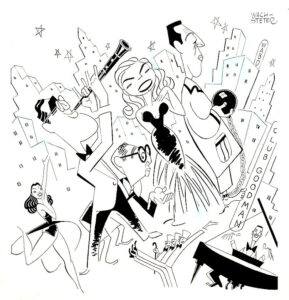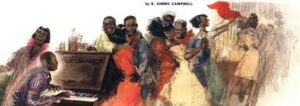Thriving in this secure burgeoning world, thoughtful in all matters of the mind and plenty serious, I whiled away much of my leisure time engrossed in the radio, the picture theatre and books. Once I got into serious reading, my head stuck in the pages, that was it.

I became fascinated with the writers and actors I encountered, and the literary and theatrical sets in which they consorted.
I made the art, creativity and style of these originators fit my purposes.
Giving credit where it’s due, I have incorporated their works. They enabled me to create my own identity, opening a window on the outside world for me. The wide world of thoughts and dreams, myths, ideas, inspirations, intuitions brought into being by the human imagination since the dawn of consciousness.
Not just something decorative, much of the costumery we wear, the songs we sing and so on. More deeply the body of ethical and moral values that we place around each individual to keep at bay the barbaric heart that history teaches us lies beneath the surface of all humans. Our culture that enables us to make sense out of sensation, to find order and meaning in a universe that doesn’t give it freely. The glue that allows civilisation to happen and wards off alienation.
The radio acted to dispel any sense of isolation, being my main source of news, music and entertainment. My first was a crystal set that I was attached to, snuggled up under the bedcovers at night. My same time, same station ritual before getting shuteye. The single family wireless receiver was built like a piece of furniture and took up a whole corner of the lounge room.
Television didn’t become widespread until the end of my schooling, thank goodness, although a number of people picked up Sydney channels once they installed large antennae.
 It was left to the ‘theatre of the mind’ to stretch my imagination, letting me create my own mental pictures around what I was listening to. High on my list in this regard were the improvised BBC ‘In All Directions’ and ‘The Goons’ of which I was one of the many listeners throughout the world. These shows featured the talents of the two Peters-Ustinov and Sellers-Britain’s beloved humorists.
It was left to the ‘theatre of the mind’ to stretch my imagination, letting me create my own mental pictures around what I was listening to. High on my list in this regard were the improvised BBC ‘In All Directions’ and ‘The Goons’ of which I was one of the many listeners throughout the world. These shows featured the talents of the two Peters-Ustinov and Sellers-Britain’s beloved humorists.
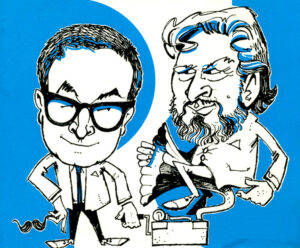
‘In All Directions’ regarded as a forerunner of the Goon Show featured Peter Ustinov in a Beckettesque road movie, driving round in a perpetual search for Copthorne Avenue.
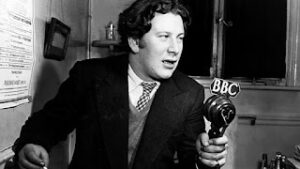
Peter was a real card who exploited his renowned gift for mimicry to the full. The comedy derived from the characters he and his partner met along the way, often also played by themselves. I aimed to emulate Ustinov’s fine ear for characters and sounds, his perfect command of accent and intonation. I worked at reproducing musical instruments, bird cries in our garden and car impersonations. By taking off his, mine were so accurate that I could get people to leap on to the pavement to avoid being run down by non-existent vehicles. It was my ‘car’s’ cold start one morning that led to my father jumping out of bed, expecting to see his car being driven off.
Such skills could come in handy. Once on a visit to Sydney a trio of louts tried to occupy my seat in a train carriage. I flipped out, acting as if I had been bitten by a rabid dog. This sent them packing.
The Goons’ zany miscellany of skits and bits mixed cockamanie plots with surreal humour, tag lines, quips, cranks, puns and catchphrases. They cooked up lots of ludicrous scripts with an array of daffy and bizarre sound effects.
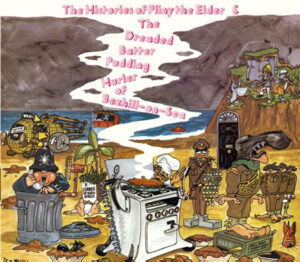
Their show had no rules.
Appealing to the latent eccentric in me it sharpened my sense of the absurd. The bubbling humour they created also infected the Monty Python team and the Beatles, all who would give me great delectation. It would be the sound of his troublesome stomach that would announce the arrival of the cloddish Major Dennis Bloodnok, a well known coward who deserted from the British Army. This was one of the many characters of Peter Sellers, the impressionists’ impressionist, who could even do a Spike Milligan, his fellow Goon. Peter took on the voice of Hercules Grytpype, a smooth talking con man. He was the twittish boy scout Bluebottle whose flummoxed and flummoxing persiflage with Eccles take place in many of the Goons’ sharp scripts.
At the other end of the age spectrum he was the extraordinarily antediluvian Henry Grun who defies old age and the dreaded lurgy with ‘Get Fat Hormones’. Having lived in India Peter was a master at taking off the broken English Hindi accent through his characters Lalkaka and Banerjee. The Goons’ characters were largely based on dimwits or cads they came across in the forces, or in Peter’s case at a minor public school. With their vocal dexterity their characters took on a life of their own. The Goons was a showcase for Peter’s improvisational talent with he and Milligan perfect foils, sparking ideas and situations off each other. I aimed to capture such clever casualness and off-handedness in my own call and response verbal volleys. Trading banter with partners of the right chemistry, playing off each other’s reactions, feeding a continual flow of fuel.
‘Did you know I invented the echo?’ I asked my mate Owen.
‘Just listen to yourself—self—self,’ he replied, happy to act the foil.
Best Sellers.
Peter Sellers was one of the worlds greatest character actors, especially in comedy.
This son of struggling vaudevillians was also a very disconsolate man, often infusing his comic characters with an undercurrent of deep melancholy, reflecting his own mood indigo.
This bolstered the belief that often, behind the comic’s jokes, pratfalls and silly voices, there hides a depressed, tortured clown, squeezing laughs from audiences in an attempt to avoid crippling melancholia.
Aiming to help him in a small way overcome his personal insecurities and lack of a well adjusted self-image, I would congratulate him for his comedic legacy for which he thanked me very much.
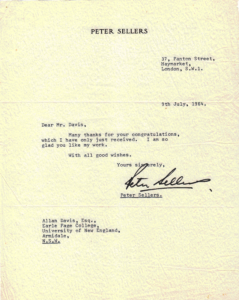
I told this enigmatic figure, who often claimed to have no identity outside the roles that he played, how impressed I was with his astonishing range of characters which had earned him international stardom at a time when rigid typecasting was usual. He had a good nose for playing multiple characters, making the individual characters distinct, frequently with contrasting temperaments and styles, for example in “The Mouse that Roared’ as well as ‘Dr Strangelove’, considered to be his best film. In it, he took on three different roles seamlessly integrated into the end-of-the-world storyline. He had a gift for playing different nationalities and ethnicities. He could embody his characters with such wonderful, ‘out there’ characteristics.When Peter Ustinov dropped out of the role of Inspector Clouseau, Peter Sellers stepped in and made Clouseau his own.
Peter strove to avoid playing the same character twice. He especially enjoyed slip-sliding into characters much older than himself. He could slip in and out of characters as easily as one slips in and out of a jacket.
In Lolita as a mentally unbalanced TV writer with multiple personalities he mined emotional depths and reached crazed comic epiphanies unmatched in his later work. Playing what could have been a subordinate role, he steals the movie. His hotel porch confrontation with James Mason’s Humbert Humbert is a marvel of nervous energy and quirky timing.
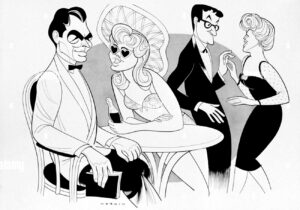
He played three of the roles in the Cold War satire, ‘Dr. Strangelove’ including the wild haired, menacing scientist.

Watching him I became aware of that sense of lunacy lurking. You never knew when his role would be as someone provocative, sensible, totally insane, singing, shaking his booty or exploding. He was a unique combination of being extremely subtle and over-the-top all at the same time.
A Man Of Capacious Talent.
I congratulated actor, raconteur and humanitarian Peter Ustinov for adding to the public stock of harmless pleasure with some darned good acting thrown in for good measure. I told him, ‘You have enriched the gaiety of nations. Good for you.’
As an actor, he won international stardom as a lurid, gloating Nero in the 1951 epic ”Quo Vadis?,” gained increasing stature by playing sly rogues and became one of the few character actors to hold star status for decades, adjusting easily to movies, plays, broadcast roles and talk shows, which he enlivened with pungent one-liners and hilarious imitations. I told him he was far from being an epigone. This was no faint praise.
I congratulated him in particular for his portrayal of the slave owner Lentulus Batiatus in another sword-and-sandal epic, Stanley Kubrick’s ‘Spartacus’ which brought him the first of two supporting actor Oscars.
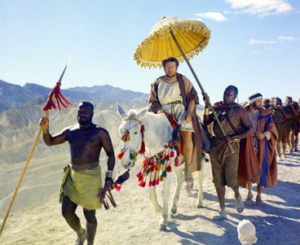
As the unctuous self-disparaging slave dealing Lentulus Batiatus, purveying shapely females to the Roman upper classes, owner of a gladiatorial school, his instructions were to bully Spartacus mercilessly and break his spirit. Fellow actors still analyse the almost throwaway technique of understatement with which he upstaged Laurence Olivier during that player’s prime.
Peter sent me his best wishes from the Lake Geneva area.
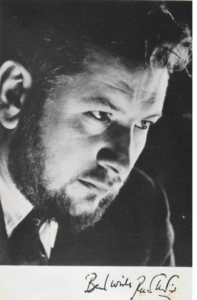
He lived there in his later years along with his friends and neighbours, Graham Greene and Charlie Chaplin.
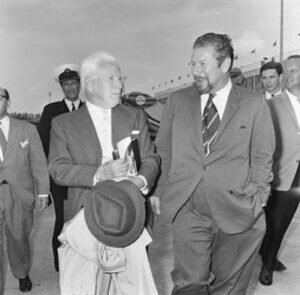
Avid readers of the latter’s novels, Charlie, Peter and I couldn’t get enough Greenes in our diet.
Peter’s acting career was characterized by numerous roles in which he displayed those talents for vocal mimicry and age affectation. In 1946 he played the detective, twice his own age, opposite John Gielgud in a legendary stage version of Dostoevsky’s Crime And Punishment.
“He ceased; but left so pleasing on the ear his voice, that list’ning still they seemed to hear.”
Homer, describing Odysseus’ effect on an audience in a faraway land.
As a child I came to Sydney during school holidays and other times to stay with my father’s sisters. I got to range over this big city, especially its centre, on my own hook. Like most people I like to watch the activities on building sites. This particular one I came across in November, 1960, just a stone’s throw from Circular Quay, my reference point, was not like any other. This was where the latest wonder of the world was being constructed. The Sydney Opera House. I asked one of the hardhats entering a gate how I could get approval for a look-see.
‘How far have you worked up those tricky sails structures?’
‘Listen Sonny Jim,’ he said hurriedly, hugging an oxy acetylene cylinder, ‘after a slow start, I can assure you now we’re cooking with gas. Come and see for yourself. The opening act is just about to start. If you want to see and hear a world class act, just tag along with me. You can do the official tour anytime.’
Was he fair dinkum or having me on? Curious as to what kind of artistic performance this labouring man could offer, I decided to take him up on it. He led me through a maze of massive concrete slabs, building machinery and the general clutter of a construction site, onto the performance space – this stupendous expanse of concrete platform, resembling an ancient Mayan temple, decorated with cranes. Workers were standing, sitting on their haunches or perched on the scaffolding eating their lunch, gathered around a burly, imposing black man of commanding presence. He spoke slowly and deliberately and with force. We were all hushed, spellbound as this extraordinary beautiful, deep, rich, bass-baritone set of pipes, as calm as the water lapping around the site, then began to boom.
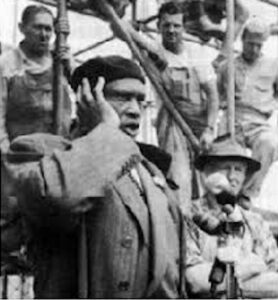
Bowled over by the sheer magnitude of the notes his lungs and diaphragm expelled, I realized his stirring voice must have carried far beyond. He would have been heard from miles away. His singing without accompaniment lent a highly personal atmosphere to this impromptu standout performance. I recognized the voice as soon as it opened up. There was only one in the world like that – Paul Robeson. Except that when he broke into Old Man River, he had changed the lyrics, ‘ No more “tired of livin’, scared of dyin’”, to “must keep fightin’ until I’m dyin’.
He sang the stirring song of protest ‘Joe Hill’, about the unionist/songwriter.
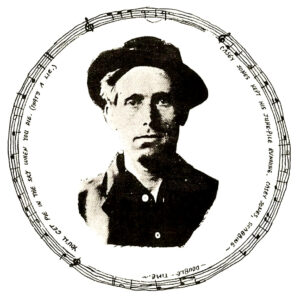
Joe was summarily executed for murder, many believe on trumped up charges.
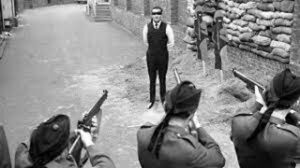
In the song Joe who had supported strikes by rail workers is remembered as an inspiration who lives on.
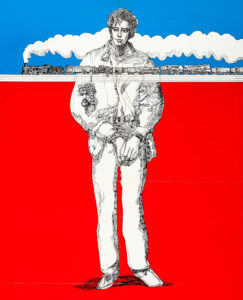
So powerful in the directness and simplicity of its melody and lyrics.
Paul sang that “what they could never kill went on to organize.”
In his rendition it became a moving hymn to the never-ending struggle of working people for justice.
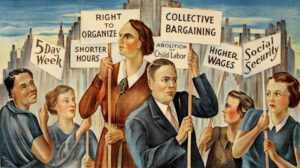
It closed with the words “Don’t mourn for me, but live for freedom’s cause.” Goose flesh manifested.
Rising to our feet we rewarded him with our extraordinary attentiveness and warm-hearted response. These construction workers raised the roof.
There was just something, that drew these workers and Paul Robeson together. I think it was like a love affair, in a way And that seemed entirely right.
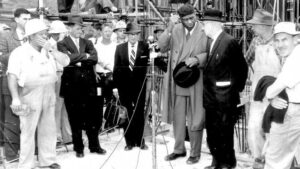
At the end of the impactful performance Paul met and talked to us well-wishers.Those eager to speak to him at the end asked questions to learn more about his life. We gave moving remarks on how we were motivated by his commitment.
While escorting me outside my host explained to me the nature of this event:
‘Our trade union invited Paul to come here today. He can perform anywhere he likes-in palaces, in grand theatres, but he prefers to play directly to the people he believes in – those who earn their bread by honest toil – the common people. He has even gone to Russia to perform to workers.
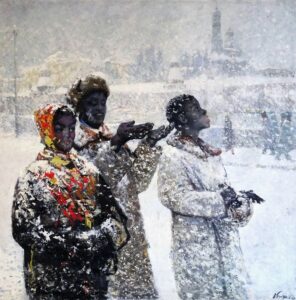
He sees us as truly brothers and sisters in the great family of mankind. Like Joe Hill did, Paul sings at union meetings, on corners and picket lines, to us. His message is simple:
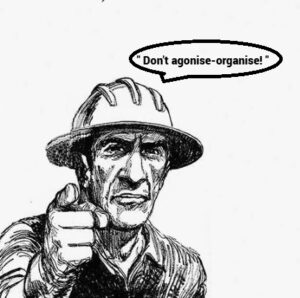
‘Although we are the ones who build this mighty structure, we know we won’t be the ones who’ll be able to afford it. So this is a once in a lifetime occasion for us. For an hour at least we’re the ones who call the tune.’
The Soundtrack of my Youth
At the beginning of the 60’s I entered a musical quiz broadcast by the mobile studio of the local radio station 2MO at the local show. As a kid, I was chuffed to win against a local schoolteacher and to receive something that was brand new to the world – a transistor radio. This breaking of the nexus between the radio and the power point was an exciting development. It brought with it a profound increase in the exchange of knowledge, ideas, and information, which in turn influenced my generation to become more of a going concern in politics and other affairs which affected us, than what our preceding generations would have been. Wrapped around my ear, it provided me with a companion to fend off boredom wherever I was and to lay on background music for whatever mood I wanted. With my ear to the ground, twiddling with that dial, I was well and truly switched on.
This revolution in listening consummated the age of fast expanding mass media whose birth coincided with mine. The baby boom and economic growth had fuelled the emergence of the youth culture I grew up in. I wondered what had happened to the big famous big swing bands that had come before. The leader of the local brass band, Ivan Laing filled me in on this.
‘Allan,’ he said, ‘it costs a bomb running a small town band. Imagine how more so it is for big bands. The big professional ones had to cash in their chips. During and immediately after the war bandleaders became balled up and chained down with big musical units. With shortages of fuel and limitations on audiences and available personnel, they became uneconomical. Many musicians felt it impractical to carry on this tradition. The big bands were replaced by smaller combos, using electric guitars, bass and drums, amplifiers and microphones, producing 45 rpm records. What’s transforming the musical soundscape now is rhythm and blues from the inner-city ghettos exerting itself in various forms.’
Those with an eye for tapping into the huge emerging market that accompanied these changes knew the importance of the means of communication. Of course, it was forces stateside who ushered in the birth of the rapidly growing popular music industry to shape my listening. One of those responsible for nurturing it on the British side of the Atlantic was Norrie Paramor, head honcho of recording for the giant EMI Corporation. He had a head both for music and the industry. His background as composer of movie soundtracks, arranger and orchestral conductor, enabled him to become one of the top producers of easy listening and early British rock and roll. He played a large part in determining what I and millions listened to before the Beatles rage. Norrie arranged and produced recordings by such artists as Eddie Calvert, Helen Shapiro, Britain’s answer to Brenda Lee, and the star turn of his stable, Cliff Richard, a knight to Elvis’ King. He was musical director for the legendary Judy Garland when she lived in London.
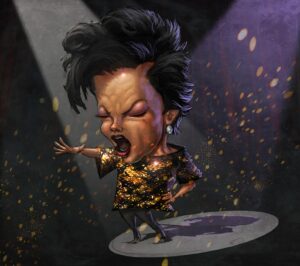
Norrie had an ongoing rivalry with George Martin, his opposite number at EMI sister label Parlophone, who had under his wing amongst others the comic talent of Peter Sellers. George was trailing Norrie in the number of hits they produced, largely due to due to the popularity of Cliff and the Shadows.
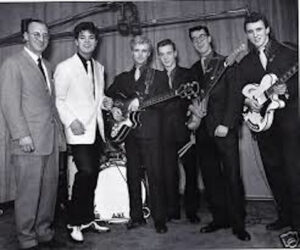
As well as drums the band consisted of lead guitar, rhythm guitar and bass guitar.

Martin seethed as Paramor racked up 26 weeks at No 1 during 1962.
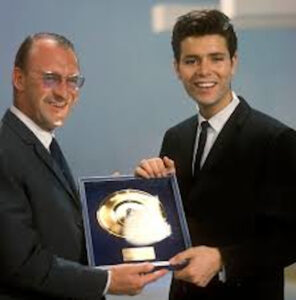
‘He drove an E-Type Jag,’ Martin remembered. “It didn’t matter what they recorded, it could have been God Save the Queen, [but it] became No 1. I envied that.’
Cliff and George kept their delight and disappointment respectively about this success hidden but the Shadows couldn’t hide it.
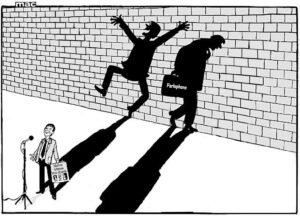
Then the tables were turned. George struck it rich. Helen Shapiro’s supporting act, the four mop topped lads from Liverpool came to George’s notice. This once in a generation sensation would sweep the field, but not before parodying the ‘Shadows’ in their instrumental ‘Cry for a Shadow’.
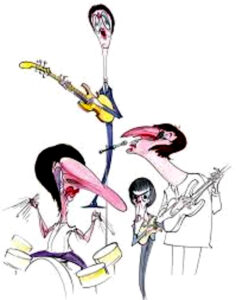
Every dog has his day and as I would remind Norrie, he had had his fair whack. I told him to take the Beatles send up as a back handed tribute. He was delighted to learn of the enjoyment he and his protégés gave me in what would seem, at least to many mums and dads looking back, an oh-so-squeaky-clean age when the sound was toned down and records kept ‘straight’.
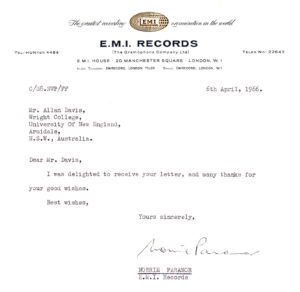
Surf’s Up.
I told Norrie how thrilled I was by the instrumental smash hit ‘Apache’, performed by Cliff and his backing group The Shadows, which Norrie put together. A pioneering example of the surf music genre with its use of twangy guitars, its innovative tribal rhythms and straightforward melody, it evoked that mighty rush I felt, the swells coming fast, hooked onto the forces of nature while surfing. Body surfing that is. Being fair freckled skin and a country mile from the salty tang of seawater, I had as scant a connection with the lifestyle of those archetypal bronzed briny boarders who hung five, hugging the coast, as had those melody making pommy palefaces.
Burt Lancaster’s tribal leader in the movie ‘Apache’ likewise had no connection with the ocean. It was his courage that inspired the tune.
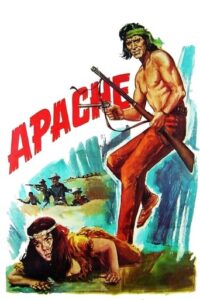
It was my own courage that came into question when I dipped my toes into the ocean. My problem with spending much time in the water was that sharks decided that that’s where they should be. I didn’t want to offer myself as a light snack. I would eventually go to the beach with my friend Neil Proudfoot to try board surfing. He kept encouraging me, ‘You coming in, Allan? Come into my maritime manor. Come and shoot the curl. It’s lovely in the water today. You can’t ride a board on the beach.’
‘No, I don’t think so. I’ll be– I’ll be fine.’
‘Why not?’
‘Why not? Because there are sharks in there. It’s their natural habitat.’
‘Yeah. But not always.’
‘The fact that there’s ever been one is enough for me.’
‘Ah, come on, Allan. You’ve got to live your life.’
‘Yes, until it ends. Maybe today, with a shark attack, you see?’
He said, ‘You’ve got more chance of being hit by a car.’
‘Not when I’m swimming, I don’t. I’ll stay here on the beach until I summon up the courage.’ I stayed right there until the heat out threatened the sharks.
That’s when a new menace threatened those in the water. Me. While Neil glided gracefully behind me, at one with with his wave, I was at two with mine. Somehow I had changed from boardsurfing to bodysurfing.
And the body wasn’t mine.
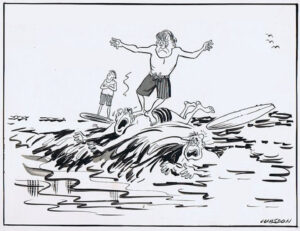
Put a Penny in It!
Going to ‘the flicks’ was undoubtedly the most enjoyable time of the week. This young movie buff got to go twice a week to this darkened sanctuary. During the week I would go with my parents. Everyone one went to see the same films. We would sit on the comfy cushioned chairs upstairs in the dress circle and see two feature films. I would stay behind at the end to collect the lemonade bottles which people left on the floor, along with their sweet papers and tickets. Sitting in the dark with others watching a screen somehow is conducive to that habit which is defiant to the cultural standard of cleaning up after oneself. The deposits on the bottles which patrons paid and which I would claim paid for my night out plus my Saturday afternoon matinee. This was a more rambunctious affair, sitting on the harder stalls down below with orange coated chocolate balls and the groundlings hissing, booing or rolling in the aisles. ‘Hey, down in front!’ How anyone could hear the films was a mystery.
A chorus of finger whistles and voices would punctuate the silence like a dose of salts when the projector conked out with slow handclapping and catcalls of ‘put a penny in it!”
The owner of the picture show would walk up and down the aisles flourishing a torch to shine on anyone too excited to watch the show.
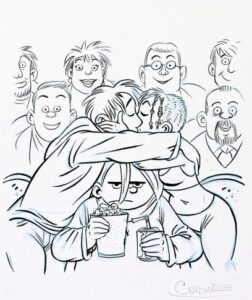 This was the best opportunity to sneak in by the side door he left unguarded.
This was the best opportunity to sneak in by the side door he left unguarded.
We kept our eyes out especially with the arrival of Cinemascope .
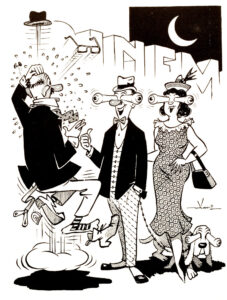
When interval came there was a rush for the toilets and refreshments. Otherwise you could stay and watch the advertising slides. Passouts were given to those who wanted to leave the building. After the dark interior inside hitting the street was like running into a flash of lightning. If you made it back late, you’d have to feel your way back to your seat, falling over legs, getting kicked in the shins and tripped up, squeezing past those already seated shushing and saying, ‘Watch where you’re going’, mind out’ and ‘this is not your seat’.
Defining our fantasies, fears and pleasures, most of the films were American.

These were followed by British and a dwindling number of locally made films. The American cinema told stories that identify a collective fear of invasion, nuclear destruction, and invasive political ideologies, reflecting this paranoia back to a receptive public.
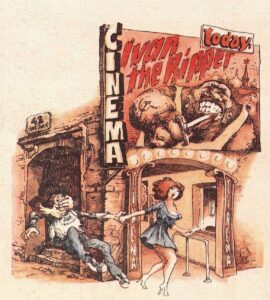
I Married a Communist is an example of this Cold War propaganda . It combines standard film noir plotlines – hidden pasts, personal failings and doomed relationships – with unsubtle political warnings about subversive communists, troublesome unions and their alleged secret agenda.
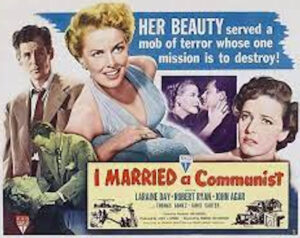
After it was announced it was “Them! Them! Them!”, the eponymous mutated, giant, radio-active, murderous ants hatched in the New Mexico desert after an A-bomb test were interpreted as Communists on-the-loose.
It was a toss-up whether the police in American noir were corrupt or not, but in British films of the 40s and 50s, corruption was startlingly absent thanks to censorship. Policemen were portrayed both sympathetically and impeccably as hard-working, caring, humane individuals while the crims were unstable delinquents on the make who got their just desserts. Forget tasers, SWAT teams, air marshals, finger printing brutal interrogations, strip searches or indeed any hint that policemen are less than saints in uniform. In the Ealing films London police, their hearts in the right place, rode bicycles, directed traffic, gave directions, found lost dogs, and even sang in the police choir. The grossest sin committed by the police was a tendency to park themselves in the police cafeteria and drink one too many cups of tea.
Sentimental viewers today may fall for the idea that these movies showed a gentler, kinder age. More cynical viewers (including yours truly) understand that they are a reflection of the age and its censorship. Not too surprising as the Harriet and Ozzie world in these films did nothing to offend. Generally these movies endorsed the idea that the police and military apparatus made us secure, standing between us and the End of Civilization as we know it.
At the end of every show the lights came on and God save The Queen was played. Everyone stood in silence while on the screen appeared Her Majesty and Phil the Greek. If you didn’t stand someone would remind you with a prod in the side. Most of us didn’t know all the words and just mumbled along after the opening lines.
This was a particularly barren point of time for the Australian film industry. The hunger for local people to see their own stories on the screen was voracious. They were nostalgic for a time of hardy pioneers. When the classic ‘On Our Selection’ film featuring the rustic Dad and Dave came to the pleasure dome, the queue to buy tickets stretched along Conadilly Street, the main drag. Usually the only Australian content of the program was the newsreels, as often as not giving the latest update on the ongoing ‘war between good and evil’, on the battle against the ‘Reds’ for world mastery. Kicking off the matinee performance was the American serial with its ham acting and crude special effects, laughable today, but gripping stuff for us kids then. A variety of short films of topical interest and cartoons would provide filler until the main item started rolling.
The feature films of the fifties overwhelmingly reflected conservative values with white-bread social, gender and racial roles being promoted. Men were men and women’s place was in the home.
Any African Americans looned around and popped their eyes while playing maids, servants and crazy legged dancers. The ‘natives’ in the Tarzan and Jungle Jim films were usually relegated to romantic backdrops to be exploited by civilized white men or eaten by wild animals. Or they formed implacable hordes, red in tooth and claw, who only understood the language of force.
Occasional outbursts of defiance and rebelliousness as portrayed by individuals if not by organized political groups made it through to the Civic Theatre in Gunnedah. These were conveyed in films such as The Wild One, Rebel Without a Cause, Blackboard Jungle and The Young Savages. Performances by Marlon Brando and James Dean as contemporary anti-heroes added some reel biff to a fairly long period of sanitised run of the mill releases.
They examined the topic of juvenile delinquency, one in which American independent film-makers had already taken an interest.
It is the subject of the hard-hitting street gang murder thriller ‘The Young Savages’. It’s a dramatic companion piece to “West Side Story without the music and romance.
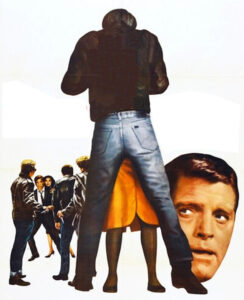
Burt Lancaster’s cinematic character, the Assistant D.A. has to solve a disturbing, horrific murder case .
The main focus of attention, composed and controlled, honest and impassioned, Burt delivers a typically solid performance . He nicely balances sensitivity and concern with his patented macho bluster.
With brilliant camera work the film would influence the later work of Scorcese.
Coming out at the end of the conservative and seemingly blissful 50s, I was not used to watching such shockingly raw depictions of racial tensions, bigotry and public servants putting their ambitions before justice.
It helped me understand the social conditions driving youth to violence. I was interested not just in how the intrepid attorney solved a criminal mystery but how he sought to uncover the psychological reasons behind the defendants’ reprehensible actions.
What he learned humanized these young killers without absolving them of responsibility.
Examining similar themes as ‘West Side Story’, the more noteworthy release of 1961, The Young Savages is part “social conscience” film, part court-room drama.
Unlike the colourfully aestheticised take on gang warfare on the Lower East Side of NYC, ‘The Young Savages’ is more introspective as It aspires to be a revealingly realistic insight into juvenile delinquency, a topic in which American independent film-makers had already taken an interest, their works making their way to my local cinema. Often brandishing a tough, uncompromising edge, ‘The Young Savages’ strives to solve a social problem many cities still grapple with today.
At the same time, complete with Italian and Puerto Rican gangs facing off, fights and foot-chases , it catches the wild fury of gang pavement and alley warfare in the rough asphalt jungle of Harlem, dominated by dog-eat-dog sensibilities, and sneering youth finding a better fit among peers than at home.
The civil war is all about defending ones turf. Opening in much the same stirring manner as the Oscar-winning musical, ‘The Young Savages’ sets up a showdown between two rival gangs in the New York City slums. Three Italian teens, members of a gang called the Thunderbirds, dressed in black leather jackets and roll up jeans cross over from their Harlem Italian neighbourhood and angrily storm into Spanish Harlem.
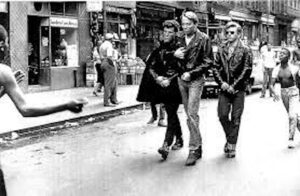
The members of each posse have been willingly brainwashed by a warped code of ethics and predatory mentality since they first ventured onto the city’s dangerous streets, and both groups harbour a mutual hatred based on ethnicity alone.
Burt’s character has to deal with these hooligans while at the same time protecting his socialite wife from their attack.
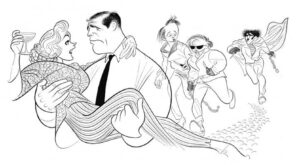
On the screen I had seen endless legions of American Indians mowed down to expand the frontier of civilization. When the cavalry won it was a great victory, and when the Indians won it was a massacre.
I told Burt Lancaster it was an eye-opener for me to see him interpret their plight as the result of white conquest and displacement rather than the result of their own ignorance and barbarism. While typically still using non-Indian actors for such roles, ‘Apache’ was one of the first films to depict the Indians sympathetically and one of the liveliest. A dazzling frame for non stop action, the film is full of spectacular battles, breath-taking chases and tight suspense.
Burt took on the persona of the renegade Apache, Massai.
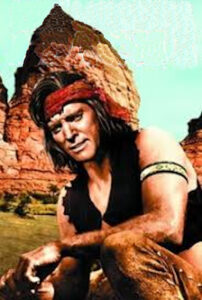
Fired by his exploits I in turn envisaged myself as this indomitable warrior of sorts. Refusing to be treated as a slave and being forced to kill others. Refusing to accept the kind of humiliating surrender that Massai’s chief Geronimo had submitted to after years of bloody fighting with settlers.
Going native, I horn in on the surrender ceremony in mid-stream to hurl defiance at the top dogs. Cut to the the prison train I‘m transported in. I make a break for it to undergo an epic journey back to my home. With unflinching strength and enormous cunning, I wage a one man war against the US cavalry. Scampering over rocks and rolling unscathed between the wheels of racing wagons, I squeak through. I keep one step ahead of the highly trained soldiers, riding the skin off their foaming horses, pounding the prairie, raising a cloud of yellow dust. They have sworn to track me down. As my resistance escalates into a final show- down, I know I must persevere, not only for my own life, but for the pride of my people.
This the cinematic warrior does, for the sake of the film studio who wanted a happy ending, against Burt’s wishes. The historical Massai was brought to bay by the cavalry and cut down. It seems we could only have our eyes opened so much at a time.
A Question of Colour
Another film that impacted on this young cineaste during the period was “Jedda”.
I remember the posters outside the picture theatre announcing it’s coming. Interest in them was off the charts.
The straplines read “The magic of the native mating call was stranger than the habits of civilization” and “The drama of a girl caught between civilization and the call of her native instincts”.
Such words acted to stir the blood of the local people. This wasn’t another feel good movie with Doris Day. ‘Jedda’ was daring, long awaited and duly well patronized. It was the first Australian feature film in colour and the first in which the indigenous cast played themselves. Colour was an important element because the film dealt with the question of skin colour, still then an important determinant of one’s status in a racially divided Australian society. At the premiere in Darwin, first nation people were kept separate from the white folks. Only the two stars could sit upstairs in the comfy seats. At its first showing at the Civic Theatre in Gunnedah, I sat downstairs in the stalls with my nanny, Rose who took me as my parents were flat to the boards renovating our shop.
Turning on the aboriginal stars, the film was the first to give considerable weight to their emotional lives. Marbuck is the tribal young blood in this outback take on the Romeo and Juliet star crossed lovers scenario. He is dignified and proud, ignoring the castoff trappings of civilization. He’s not wearing trousers like the other Aboriginal men, and he never puts those dacks on. He is introduced at the beginning as a problematic outcast. He makes an entrance to the station and is told by the owner to leave and camp away from everyone else. When he is shooed off, he’s being shunned, but his egress is also a marvellous entrance and we see about four different shots of his handsome body. Jedda, the object of his desire is a young woman who was taken in and adopted as a baby by a white family.

She learns how to read, write and dress like a white girl
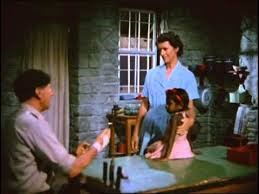
and is steered towards white tendencies and away from first nation norms.
Yet she feels an increasing sense of solitude
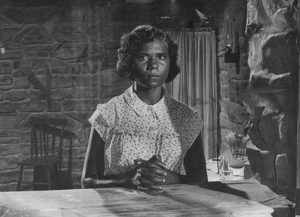
She feels more and more fascinated by the tribal life style.
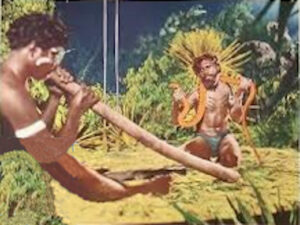
Unlike the case of Rose Watley, this lifestyle draws her to it. It remained intact much longer in the northern territory of Australia. Jedda, who longs to go on the walkabout every year, hears tribal chants over her European piano. She is torn between two races and cultures.
It is Marbuck’s mating call that entrances her and stirs her awakening as a woman.
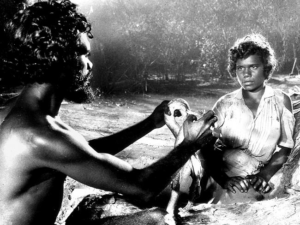
He takes delight in tearing down the wall that the mission has erected around her heart and makes off with her. Pursued by the white family and shunned by Marbuck’s tribal council because of her wrong “skin colour”, their attraction proves fatal.
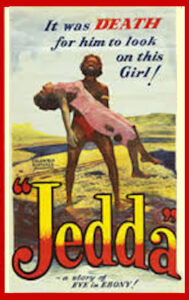
Driven insane, Marbuck takes Jedda with him in leaping to his death. The passion that Marbuck and Jedda aroused in each other had the same effect on the audience, leaning forward in their seats.
Chauvel, the director knew inside out how to tap into the great fascination white Australians have for the land and its ‘noble savage’. Many see black blood as having been flyblown when intermingled with that of whites, as more important than the corrupting effect of their dispossession. We were spellbound by the physical beauty of the couple. There were few dry eyes in the cinema the evening we saw it. I heard much snuffling and blowing of noses around me. We were awed by the sight of this rugged wilderness, this savage Garden of Eden, alive for the first time in all its glorious colours. Later my father showed me the bluff near the Blue Mountains in NSW where the stirring finale had to be refilmed.
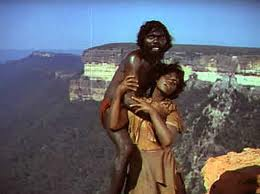
This film had all the right ingredients for a classic. Like ‘Apache’ it delivered its message in a popular action packed adventure formula. Marbuck could keep pace with Massai on the land, wrestling crocodiles, using fire to throw off his pursuers, using water to cover his tracks and being expert with both spear and rifle. Like “Apache”, it showed indigenous people in a more humane light, both providing a strong sounding board for me to discuss racial issues. It was highly critical of the then-prevailing policy of assimilation. It boldly rejects the notion that indigenous Australians should conform to the expectations of European Australians.
At the deeply affecting end of ‘Jedda’ no one in the cinema was moving. No one was talking. For several minutes the whole audience sat in stunned pin-dropping silence save for scattered gasped sobs, blowing noses and softly catching their breath. Red cast down eyes and clutched hankies betrayed what even the the stoniest of viewers had been reduced to.
The story had raised the question of what it is to be Australian.
It also raised the question as what had happened at the local rock formation known at ‘Gin’s Leap’, a towering wall of stone left high above the plane by a volcano millennia ago.

The name is said by some to derive from an Kamilaroi woman who leapt to her death. The widely accepted origins of the current name follow the tragic death of a pair of ill fated young aboriginal lovers, another modern day Romeo and Juliet. The young girl, promised to an elder of her tribe, the Kamilaroi, scarpered with a young aboriginal man from another tribe. Hotly pursued by tribesmen and the unwanted suitor, the lovers jumped to their deaths from somewhere along the top of the cliff face.
But did they really? It’s hard to say. Was this nothing more than a powerful illusion created by certain ‘gubbos’- whites- who had made it a tragic black spot.
You see, Rose had another version of the tale: ‘We don’t call the rock that name. It’s not nice. We don’t like being called ‘gins’ or ‘lubras’. It’s not respectful. Our people know the rock as “Cooloobindi”. A bunch of local farmers who saw our mob as a problem rounded up our women and they marched them to the top. They gave them a choice- to jump or to be shot. Black blood runs all over and that river it runs deep, no matter what the sign reads underneath Gin’s Leap.’
I’m not claiming to bear witness and I know people are sensitive to their history.
But if asked to pick a story I know which one I’d believe.
Our Neck of the Woods
The power of the still image came to me in the illustrations and photos of our library books, but quantitatively in magazines and comic books.
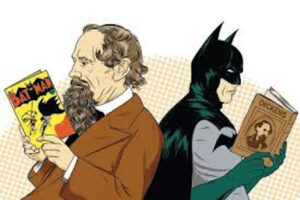
The proximity of words and images accelerated my reading ability greatly. That’s why I particularly loved cartoons.
Not everyone did of course. Some warned they could be a bad influence on children.
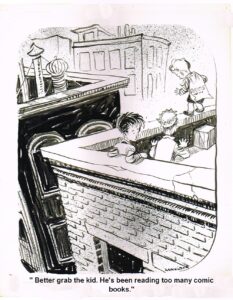
Whenever I saw the images in books, I longed to have my own copy. Not alone, I had that envy of those who had the luck of the draw.
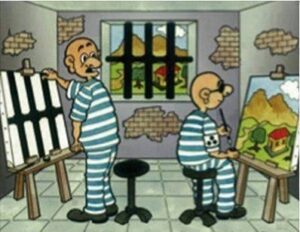
I accumulated a humongous repository of comics. Starting with a few, I swapped small ones for bigger ones and bigger ones for more smaller ones until shazam! I had a huge stock to marvel at. Popular items included Dick Tracy with his futuristic wrist phone that now seems so commonplace, and the nose thumbing Mad Magazine with its keen joy in exposing the fakery behind the images the ever more powerful mass media were pumping into our lives. The publication aimed a peashooter at corporate hype.
It’s mascot and cover boy was scrawny Alfred E Neuman. His distinct face featured his parted red hair, gap-tooth smile and freckles. It was an impish face that didn’t have a care in the world, except mischief.

Mad was magical, objective proof to kids that we weren’t alone, that there were people who knew that there was something off beam, phony and funny about a world of bomb shelters, brinkmanship and toothpaste smiles. MAD’s contrarian identity was clear from its debut, with its parodies of pop culture and a comic that skewered a new habit of suburbanites: gathering with friends to watch television while not speaking to one another.
The magazine gradually instilled in me a habit of mind, a way of thinking about a world rife with false fronts, small print, deceptive ads, booby traps, treacherous language, double standards, half truths, subliminal pitches and product placements; it tried to warn me that I could be merely the target of people who claimed to be my friend; it prompted me to be alert to to mistrusting authority, to read between the lines, to take nothing at face value, to see patterns in the often shoddy construction of movies and TV shows, to cut through the schmalz.
One of my finds was a classic copy of ‘Flash Gordon’, the space cowboy series which featured the evil emperor, Ming the Merciless. This was the cognomen given to Menzies (who pronounced his own name ‘Mingzies’) when he tried to deport an anti-fascist, anti-war immigrant to Europe before the war, my dad informed me.
Among my favourite reads was the popular comic strip Li’l Abner set in the fictional backwoods community at Dogpatch, U.S.A. This hillbilly world became familiar caricatures of American life. Sunday mornings would see me dashing along Conadilly Street to the newsagent to make sure I didn’t miss out on the newspaper with its comic supplement. Cars swerved to miss me as I sprinted across the roads, pedestrians avoided bumping into me as I walked back slowly along the street poring over the latest instalment.
The characters featured in this syndicated strip- Li’l Abner, his gal Daisy Mae, Mammy Yokum and others- satirized famous persons and customs.
In particular Daisy Mae’s voluptuous charms tickled my fancy. Much of it was visible thanks to her famous polka-dot peasant blouse and cropped skirt. Hubba hubba.
This strip created by the cartoonist Al Caplin, who abbreviated his name to Al Capp, included Charles Chaplin amongst its admirers.
Appearing intermittently as a strip-within-a-strip was ‘Fearless Fosdick”, a spoof of Dick Tracy, set in an unnamed American metropolis lousy with crime, where the sun refuses to shine, where you shouldn’t make a sudden move. Where anything can happen and it usually does. Where you can have both your heart broken and your head broken at the same time.
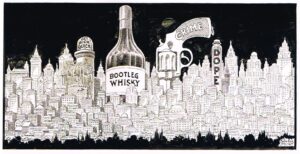
Its urban setting filled with tough guys, burnt-out buildings everywhere, narrow alleys, rubble spilling out over the sidewalks, cheap bars, greasy spoon diners, people living on top of each other, their expressions reflecting the destitution of their surroundings.
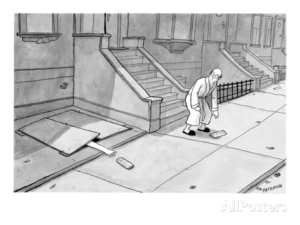
So tough it was said you could walk six blocks without leaving the scene of the crime.
So tough you couldn’t avoid trouble. It came looking for you.

So tough the standard reply to the school teacher asking children, ‘What comes after a sentence?’ was ‘An appeal’.
So tough it was said even the muggers walked around in pairs.
So tough when asked how far it was to the subway a policeman replied, “I don’t know, no one has ever made it.
So tough even the police even the police had an unlisted number.
So tough the high school newspaper had an obituary section.
So tough you could receive a deliberate hit and run on the pavement from a pedestrian.
So tough when you went to buy silk stockings, the shop assistant wanted to know your head size.
So tough anytime you put your hand in some wet cement you felt another hand.
So tough when a medico bought a therapeutic water bed, he found a body at the bottom.
So tough every time you shut the window you hurt somebody’s fingers.
So tough the kids take hubcaps-from moving cars.
So tough in a good building, you got a doorman. He didn’t say ‘Good evening’, he said, ‘Good Luck.’
So tough In a bad building, you just got a man in a door.
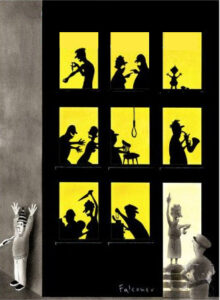
So tough at Easter time the children had little porcupines instead of bunnies.
So tough if everyone was seen to be smiling at once, it must have been Halloween.
So tough giving the wrong look can land you in hospital.
So tough paranoid people moved there for health reasons. It’s the only place where their fears were justified.
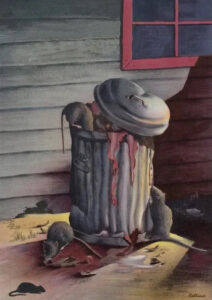
So tough if you needed to exit off the motorway for fuel there you’d say, ‘Damn it, I don’t need gasoline that badly.’’
So tough if you stopped at a motorway siding you’d be content to see the city through binoculars.
This all stood in stark contrast to Li’l Abner’s rural Dogpatch. In combatting crime Fosdick was himself responsible for astronomical collateral damage,
Making for twice as much reading fun,Li’l Abner bookended the offbeat Fosdick sequences as a narrative framing device. Abner himself serves as a rustic Greek chorus—to introduce, comment upon and sum up the Fosdick stories. Typically, a spun up Abner would race frantically to the mailbox or to the train delivering the morning newspapers, to get a glimpse of the latest cliffhanger episode. Every so often I would walk back from the newsagent reading about Lil Abner walking away with his latest copy, reading about Fearless Fosdick. I got two for the price of one.
Subsequent instalments of L’il Abner would reinforce his obsessive immersion in the unfolding Fosdick continuity while at the same time recapping the story-within-a-story. Oblivious to the surrounding ‘real’ world Abe would walk off a cliff or into the path of an oncoming train, or inadvertently ignore one of Daisy Mae’s perilous predicaments. Occasionally the gullible, bumbling and impossibly dense Fosdick’s adventures would directly affect what came down the pike to Abner, and the two storylines would artfully converge. The story-within-a-story often ironically paralleled and or parodied the story itself. Also, by having the comically obtuse Abner “explain” the strip to Daisy Mae, Capp would use Fearless Fosdick to self-reflexively comment upon his own strip, his readers, and the nature of comic strips and “fandom” in general, resulting in an absurd but overall structurally complex and layered satire.
I can now, after a fashion, walk along my risky city floor reading about me walking along the risky country streets of Gunnedah reading about L’il Abner walking along the risky country streets of Dogpatch reading about Fearless Fosdick walking along the risky streets of the city. A story-within-a-story-within a story. It remains for some literary critic to write about my writing to extend the layers.
Sparing no-one his merciless needle, Al targeted all kinds of mossbacks, radicals and liberals. Some sharply satirical episodes of Li’l Abner were censored in early strips.
Al had a strong background in portraiture, capturing the poses and facial expressions of celebrities such as Bob Hope.

While the details remain sketchy, his irreverent art stayed with me as I got older. With adult readers far outnumbering juveniles, Li’l Abner forever cleared away the concept that humour strips were solely the domain of adolescents and children. Li’l Abner provided a whole new template for contemporary satire and personal expression in comics, paving the way for MAD.
I would commend Al for the wealth of characters he created. I pointed out to him that many country cousins of his rustic folk lived in our part of the bush. Al thanked me for having taken the time to write to him so kindly.
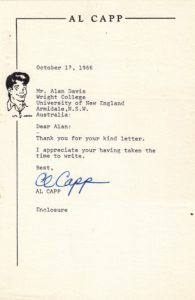
Wishing me the best, he threw in a drawing of Li’l Abner and Daisy Mae in full stride on one of their humorous adventures.
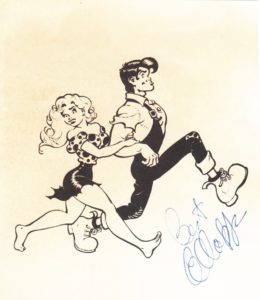
The Busy Bookworm.
“Read well and you will write well”
Sir Max Mallowan.
An archaeologist is the best husband a woman can have; the older she gets, the more interested he is in her.
Agatha Christie on Sir Max Mallowan.
With an eye to learning and edification and with strong jaws I wolfed down books, my mother’s milk, from the local library, starting with the Enid Blyton children’s books when I was little. Gradually I began diving into boys stories of wartime heroes and space adventures.
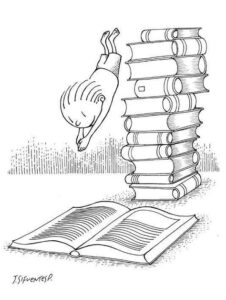
By the time I entered secondary school I was one of the innumerable readers of the second most published author in the English; by the time I left I was tackling the leader of the pack.
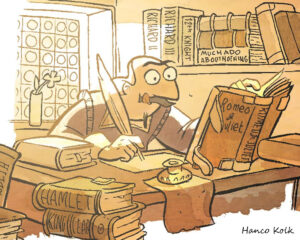
When reading Shakespeare’s works, a turnoff to many inching through his works at a velocity of ten lines an hour, it broke on me that along with owning books, reading was one of the greatest gifts we have. It takes us beyond ourselves.
Some of my mates missed out sadly on both counts. They couldn’t read well.
They mixed up the stories.
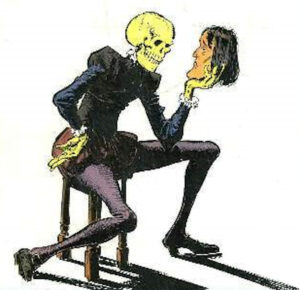
One thought Hamlet was a baby piglet.
They never even knew we had a local library. It was kept quiet.
One day Jack Locock staggered into this municipal library. He rolled up to the counter and looked at the librarian Ms. Beth Rixon dead in the eyes and screamed ““Lady, I’ll have a bottle of claret and packet of fags.’
Ms. Rixon shushed him and sternly said in a whisper, “Sir! This is a library!”
Jack immediately apologized and whispered slurringly,“So sorry, Lady, I’ll have a bottle of claret and a packet of fags.’
I encouraged one of twenty year old customers from the bush to find out about this vital resource.
‘What’s the big deal about reading books?’ he asked.
‘They can provide you with the keys for lifelong pleasure and figuring the out the world,’ I assured him.

‘My sheila helps me there already. She leaves me the keys to her house when her oldies are away,’
‘Good books are like good friends,’ I assured him. They entertain us, provide insight and advice, broaden our perspective, and help us understand others. When we find those that we really relate to, we return to them again and again for comfort and guidance.’
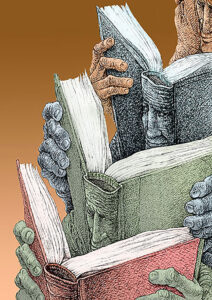
He rang up finally and asked Ms. Rixon: ‘Is that the local library?’
She said: ‘It depends where you’re calling from.’
When he eventually fronted up to her desk, he said, ‘I’d like to join.’
She said, ‘You have to prove you’re a resident of this area.’
So he quoted aloud the words of the local poet, ‘I love a sunburnt country, her pitiless blue sky,’ all the while baring his chest all red, blistered and raw.
She issued him with a card without further ado.
‘Now what would you like to read ?’she asked him, ‘and why?’
‘I’ve got some penfriends overseas. I’d like to be able to write good letters about what’s going on here.’
‘Why don’t you read ‘Jane Austen’s Letters’. She writes about everyday life, about things around her in England: the weather, health, clothes, social engagements including gossip.’
‘I could write letters about our local people and what they get up to. But would she read any of mine ?’
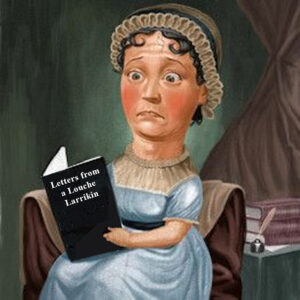
She asked him, ‘Would you like a book mark?’
‘Ms Rixon you just issued me with a library membership card. You should remember my name is Barry.’
Barry it is, then. Now Bazza, a bookmark will help you keep track of your progress in a book and allow you to easily return to where your previous reading session ended. It will keep you from dog earing the pages and preserve the book longer.
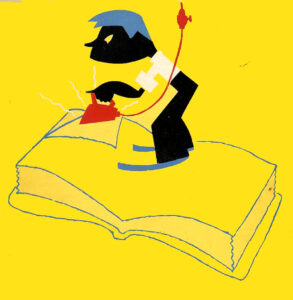
‘Is there a charge for membership,Mrs. Rixon?
‘No Barry, it’s a free service. But as I’ve just indicated to you we stress the need to protect the books. Handle them with care. We ask you not to bend the spines which are usually stiff and brittle.
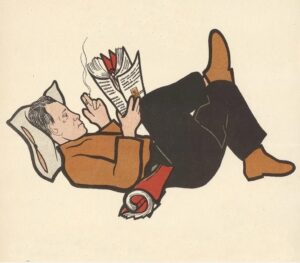
They can crack from being opened all the way and the pages can fall out. It can be difficult to get the the covers to resume their original shape. And here’s the most important rule to follow: Don’t eat or drink anything while you’re reading.
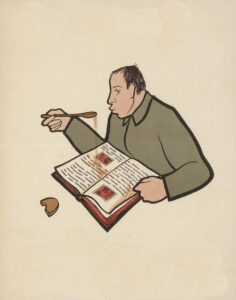
The Queen of Crime.

My mother was an avid reader of Agatha Christies mystery novels. I chose her books while I got my own and would plough through them all, exhausting the supply. I kept the town librarian, Beth Rixon on her toes stamping them with their due date.
‘Outside of a dog,’ she liked to say, ‘ a book is man’s best friend.’
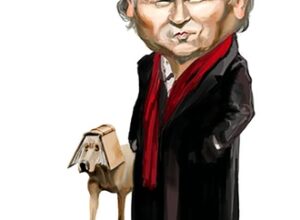
‘Inside of a dog,’ I hastened to point out, ‘it’s too dark to read.’
I was a great one for borrowing books in the morning, tearing through them and returning them at the falling of the sun. This flummoxed Mrs. Rixon. ’This is against the rules, Allan,’ she pointed out to me, turning a blind eye to this ludicrous restriction.
My familiarity with the ideas in these books and the experience of their author made me percipient of the thinking of my mother for whom they were a staple. I told Ms. Christie I appreciated her craftsmanship, spinning delicate webs of deception and mistruths in an effort to dissemble the real deal behind the façade. I told her that my mother and I had fun following the cleverly plotted and ingenious solutions that would never fail to surprise us. ‘Who knows?’ I asked myself, ‘maybe one day I too will write such mysteries’.
Indeed I would write a short one and it is part of this saga. Titled ‘A Case of Mistaken Identity’, the main character is my mother herself. The mystery is that surrounding her fate and the circumstances leading up to it. Reading further will supply you with the clues needful for getting to the bottom of it.
I asked Ms. Christie to give my regards to her husband, the eminent archaeologist Six Max Mallowan whose digs she had accompanied him on. These provided background for some of her novels. Both stimulated my interest in lost civilizations and those who seek to discover them. Ms. Christie expressed her hope for my future happiness. .
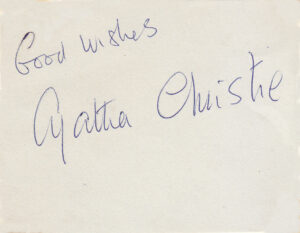
Her classic crime fiction is considered to be a leading example of the cozy or cosy style, a title which says a lot. While the subject is more often than not murder, it invariably takes place in a context that would be considered familiar, non threatening and not likely to bring significant unpleasantness to readers or to the other characters in the story. It starts with perfect order in which everyone fits securely into his or her place until a slight case of murder disrupts that order and reveals unexpected connections between the characters.
It is usually focused on members of a closed group, often in a European train or a village country house. In ‘Murder in the Library’, the members are at Gossington Hall.
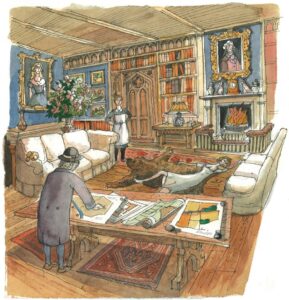
The members generally become suspects in a generally bloodless and neat, clean murder. The case is cracked wide open by an amateurish but astute detective or shrewd spinsterly sticky beak doggedly sniffing out clues-footprints, fingerprints on teacups, secret doors and the like. The characters often reflect refined personal habit – Oxford dons, threadbare aristocrats supported by down in the mouth butlers, grooms, footmen, servers and gruff ruddy constables from the sleepy hollow. As with most good detective fiction, the puzzle seems impossible to solve until the last chapter when everything’s made transparently clear. The happy endings are usually preceded by confrontation induced confessions and erudite unravelling with a minimal acknowledgement of the social or factual aspects of the crime. Much of the deduction and logic used is to explain who is behind the corpse rather than the mind bending psychological factors that compelled the killer thus.
Murder investigations were much simpler back before the advent of DNA analysis. Our gruff village bobby might report to Miss Marple like this, ‘We’ve found a pool of the killer’s blood in the garage.’ And she would be like, ‘Oh how horrible. Mop it up. Now then, back to my hunch. I’ll keep looking for clues. I’ll tell you what we’ll do. We’ll draw chalk around the body is. That way we’ll know where it was.’
I came up with an alternative to the standard mystery formula: ‘The Butler Didn’t Do It.’ After the lord of the manor is found bludgeoned to death with a silver platter, the one armed chief manservant is quickly ruled out as a suspect. Upon observation of his working motions, Ms. Marple determined Jeeves could take it, but he couldn’t dish it out.
The Bleeding Heart
If you want to find an earlier parallel to the modern contemporary murder mystery, the closest similarity is the four Gospels, especially the first three, the synoptic Gospels. People are intrigued about the sudden termination of life because it says something about what life is about. Agatha’s stories are about the death of an innocent person. The Gospels are about the death of an innocent man and what it means. These kinds of narrative speak to us about our mortality.
The mystery that engrossed my mind the most was that surrounding the ritual killing of Jesus as interpreted by the Roman Catholic Church. While other children pondered the mystery of a giant bunny rabbit delivering chocolate eggs in the middle of the night, my beatific meditation was on the suffering and insults Jesus endured, shaped by the powerful visual narrative set out in the stations of the cross. These graphic scenes following his footsteps, stretched around the church, guiding my spiritual pilgrimage of prayer. I resolved to learn to speak in divers tongues.
My parents were both Catholics and the Church played a central role in my formative years.
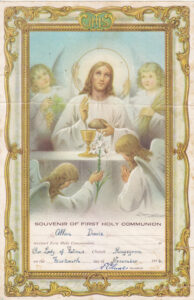
As a tyke, lining up at the altar rails, I was very moved by the image of the sacred heart of Jesus – a flaming bleeding heart encircled by a crown of thorns. A simple, credulous woman, my mother was ready to lap up any homilies dished out by the prelates. My father’s Catholicism was tribal, more secular, rooted in good works rather than dogma or pomp and circumstance. He didn’t flagellate himself or prostrate himself at the altar. Tempering his spiritual belief with a healthy dose of scepticism, he resembled so many Catholic men returned home after World War II. It was the war that sent away a generation of rich men and poor men and sent them back just men. Men that bled, men who shattered into a thousand pieces under fire, men who loved and felt fear and wanted better. While maintaining in varying degrees their ties with this almighty body with its allusion to saints, its penchant for sacrifice and its medieval views of the human condition, these Catholics in name had misgivings about the church’s restrictive social and sexual moves. They were deist in a airy fairy way, faintly Catholic in their outlook and ideas, not too much so.
‘I don’t believe in miracles, Al.’ he once told me. They’ve only been said to occur in places where people were superstitious. But I did observe something once that resembled one. Flying back home at the end of the War we passed a troopship bringing back troops. Behind it was a little cloud formation resembling a hand coming out of the sea.
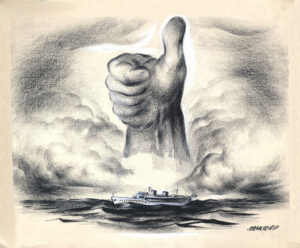
It reminded me of a Bible story I was told by the Brothers at school about such a vision.
Of course what I saw was my imagination at work. There is a human tendency to seek patterns in random information. Such sights are simply the result of coincidental patterns. The human mind chooses to interpret them in particular ways. I interpreted this little cloud as a sign of hope for a better future for the world. That’s because I wanted to see it that way. It was a more optimistic one than the mushroom shaped cloud over Nagasaki we’d just been shown.’
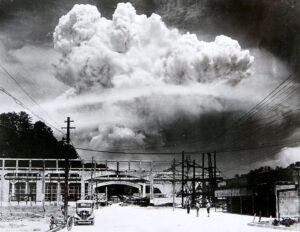 ’
’
‘From what I hear, Dad, It will be a miracle if we don’t see bombs like this exploded again in future.’
I once asked him what happens after we die. He told me we get buried under a pile of dirt and worms eat our bodies. He could have reinforced what the Church led me to believe at the time – that if I made one false move I would fritter and fry eternally, stretched out on red hot gridirons in the nethermost fiery pit, great crimson flames of hell fire licking around me – but he didn’t want to upset me.
I wore my ‘heart’ not on my sleeve but under my shirt. Strung around my neck was my scapular, a religious emblem with a cloth badge illustrating the agony of Jesus. This symbolized Christ’s suffering and love for humanity.
I had to explain such customs to my friend Andy Dall who understood- but not totally.
During my penitential preparation for one Easter, he told me, ‘I’m not Catholic, but I’ve given up picking my belly button for lint.
In the Eyes of God.
Whilst a preteen parishioner, early at the rails, I always swung a ringside seat.
As an altar boy I was quite zealous in my service. I was given that old time religion. All day long I’d biddy-biddy-bum. Down on my knees, sealed by the Holy Spirit, I’d fiddle with my rosaries, bow my head with great respect, and genuflect, reflect, expect. I’d get in line in the long processional, step into that small confessional, find out if my sin was original. Kyrie eleison, I’d play it safer, bow down more to receive the wafer. Two, four, six, eight, it was time to transubstantiate.
Reading through the New Testament Gospels, I realised how often fish are talked about. I concluded the Jesus fish is a symbol of hope.
I always felt sorry for Jesus because no matter what he did he could never live up to his father.
In an aura of incense, stained glass and theatre, a culture of symbolism and imagery, I was right up front in all the action, serving devoutly both in the local church and in the chapel of the Sisters of Mercy. Assisting the men of the cloth discharge their ecclesiastical office with bells and smells gave me first hand knowledge of these celibate shavelings and the almighty institution they served.
Burning incense is an art I found steeped in reverence, spiritual solemnity and sanctity. The grains went in a censer and as I burned them, it released a citrusy and piney aromatic smoke that danced through the church, enveloping it all in its sweet smells. I once served crozier carrying Bishop Doody who seemed blown away by the billowing cloud.
While serving one cold early morning mass, I slipped and dropped the wine cruet. The sound of the bulb-shaped container bouncing across the hard marble surface echoed off the high walls and arched ceilings. Expecting a stern tongue lashing, I braced for punishment. But Monsignor Leahy the gruff, stern local priest was thoughtful instead. One mass in the vestry after taking off his chasuble, he told me, ‘Allan, Don’t be concerned. Such mishaps can happen to the best of us. The same thing happened to Bishop Fulton Sheen when he was an altar boy. He served in that capacity as well as working in his father’s store. Just like you. Do you want to become a shopkeeper like your father when you finish school?’
‘Dad would like me to go to university.’
“Tell your father that I said when you get big you might go to St. Patrick’s Seminary at Manly and someday you will be just as I am.’
That meant someone shrewd, quick thinking and terse. The story went that he received the following phone call from the Australian taxation department. It regarded how much one rendered to Caesar and how much to God.
‘Hello, is this Monsignor Leahy?’
‘It is.’
‘This is Maria Romano from the Commonwealth Taxation Office. Would you help us complete the declaration form for one of our clients ?’
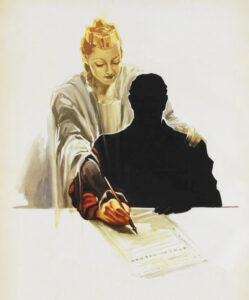
‘I would.”
‘Do you know a James Kelly?’
‘I do.”
‘Is he a member of your congregation?’
‘He is.’
“Did he donate 10,000 pounds to your church?”
‘He will. By the grace of God, he will.’
In the chapel attached to the convent, I assisted a string of priests who must have come out of the ark, too feeble to say the mass impressively in the parish church. Their idea of a good sermon was to have a good beginning and a good ending, then having the two as close together as possible.
One of these, lean, goggle-eyed and cadaverous, said to me ‘We must ritualise both the quick and the dead. Which ceremony do you like best?’
“Weddings”, I replied straight off, savouring the thought of iced cake and scads of other goodies, on top of the festive atmosphere of the occasion. They were especially enjoyable after the self denial of Lent for which one year I gave up abstinence. I managed to resist everything-except temptation.
I learned that ‘ best’ man was a misnomer as at first it was him I had expected to win the woman’s hand.
‘What about you Father? I asked,‘Which one does the Lord make you truly more grateful?’ My gut feeling was that his was the same as mine more than the lofty one he had come up with.
‘I prefer funerals to weddings,’ croaked the ancient cleric.
‘Why so, Father?’
‘It’s easier to get enthusiastic about a ceremony in which one eventually has an outside chance being the centre of attention.’
‘There’s more goodies here than at the Last Supper,’ I said at one reception. ‘For what we are about to receive, may the Lord make us truly grateful.‘
I often wondered why none of the disciples sat on the other side of the table. I reckoned that originally there were people sitting on the other side but those were the people going, “You know, there’s a strong draft from Mount Zion hitting me right on the back on the neck.’
I often wondered if there were any unrecorded miracles that took place there.

I observed the appropriate emotions accompanying each ceremony.
I learned why it is that we rejoice at a nuptial and cry at a funeral. It is because we are not the person involved.
I thought about the emotions funeral directors faced by the constant passing of human beings. They had to struggle with the constant theme of death, grief and loss. I could sense their irritability and impatience, particularly when they had to kill time waiting around for the requiem mass to finish.
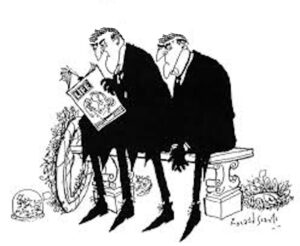
Monsignor Leahy radiated joy after each wedding.
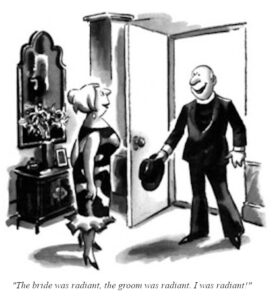
At the funeral of one of the local wealthy graziers, a man was crying inconsolably as if his heart was shattered. ‘Now cracks a noble heart,’ he declared while sobbing, ‘ Goodnight, sweet prince, and flights of angels sing thee to thy rest.’
‘I see how difficult this is for you,’ said Monsignor Leahy. ‘Were you closely related to the deceased?’
‘No, he said, choking back a sob.‘ I wasn’t related at all!’
‘But then why do you weep?’
‘That’s why!’
I was always relieved when the priest was delivering the eulogy and I realized I was listening to it.
The ancient cleric had to comfort one of his parishioners who had just lost her husband, a lapsed Catholic.
‘God bless you, Father,’ she said, ‘I’ve just come from the church where I lit a candle.’
‘That’s the spirit,’ said the cleric, ‘he’ll need all the help he can get.’
The cleric wasn’t too involved when he was commending the soul of the deceased husband to the Lord. It was an appropriately funereal day, the wind was blowing hard, rain pelting the black crowd of umbrellas and everyone wanting to get it over with. I swear so help me while watching the coffin being lowered into the ground I could hear the priest saying, ‘In the name of the father and the sun and into the hole he goes.’
‘Now your dear husband can get that final rest he always said he needed,’ he said to the widow to console her after the service.’
‘He needed a new car. He needed a heater in our bedroom,’ she replied, ‘A burial plot is the last thing he needed.’
We were in the car once with a load of slow moving cars in front of us. The cleric cried, ‘How is it possible people are driving so slowly. Even if you were out for a Sunday drive, you’d be faster than this. Driving like that requires honest to god mental effort. They must be doing it on purpose just to get on our goat.’ He got very ropeable and started shouting.
‘Hush Father,’ I said, ‘you’re ruining the funeral procession.’
After the sad ceremony I asked Colin Sills , my fellow altar boy, “When you’re in your coffin, and your friends and church members are mourning over you, what would you like them to say?”
Colin said, “I would like them to say, ‘Colin was some kind of wonderful Rugby League player, a kind person who made a huge difference in people’s lives.”
‘What about you, Allan? What would you like them to say?’
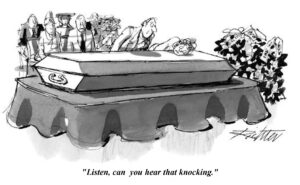
Colin and I we were always competing at sports carnivals and athletic competitions.
Sadly he would pass away in his sixties. This would prompt me to say that if life is a race, then he has beaten me to the finishing line. But if it is a boxing match. then I am the last one standing.
At one wedding we officiated at, a bubbly old hen poked a nubile neighbour and said, yanking her chain, ‘You’re next.’
She didn’t like it when the young woman returned the comment some time later. They were both attending the same funeral.
At one shotgun wedding, a case of wife or death, this priest disapproved of the groom drinking so heartily. ‘My wishes for a healthy family’, he went up and said to him.’ I hope there’s nothing in heredity.’
‘Marriage is a most sacred ceremony,’ he declared to me ponderously. Protestants can wriggle out of it without compunction. For them anything goes. Wishy-washy versions of what the Lord expects.
Those supermarket Protestants can choose from the shelf what’s convenient, what’s easy, what suits them, what’s within arm’s reach, and leave the rest. They call themselves believers yet embrace a disposable God. Consequently, too many are mispronounced man and wife. The Archbishop of Canterbury adds an escape clause for those wishing to remarry. He says it is their private responsibility, and if they seek marriage, it must be by a civil ceremony without trying to involve the Church in the act.
Monsignor Leahy told me you’ve read about Pearl Buck. He didn’t want to tell you but that fallen woman spells trouble for Christianity and the family. This sexually incontinent whore of Babylon is in cahoots with that cancerous sore, that Communist Robeson. She once told a large gathering of Presbyterians that missionaries do more harm than good. Can you believe her own father was a missionary himself? So much for the absurd idea that priests should be able to marry. What’s the world coming to?’
‘God only knows, Father ‘,I replied, nonplussed, thinking of things that weren’t necessarily so. Mind-benders as the Creation. In the beginning we were told there was nothing. God said, ‘Let there be light!’ There was still nothing much, I gathered, but you could see it a whole lot better.
The world was made in seven days. Seven was the magic number so in accordance with the mystic rules of life we got seven seals, a lamb with seven horns and seven eyes, seven days of the week, a dance of the seven veils, seven deadly sins, seven seas and seven brides for seven brothers. We got Feeding the Multitude- thousands of people dining on seven loaves of bread and fish, requiring enormous skills in preparing tapas. I had fancied my own chapter of the seven seals: seven samurai eating tapas out of seven bowls to the sound of seven trumpets.
We almost got the Seven Commandments except for Moses holding out for a better bargain:
‘These are great, God. How much are they?’
‘They’re on the arm. Free. ’
‘I’ll take 10. That’s all I can carry due to my arthritis.’
‘We got the Virgin Birth-test tube babies were not yet possible, the Ascension- what some less reverent call ‘ Jesus moving back in with his parents, ’and Transubstantiation, changing bread and wine into a man’s body and blood without the need for any digestive tract. We got the Trinity-the three in one, the triple treat. We got the parting of the Red Sea.
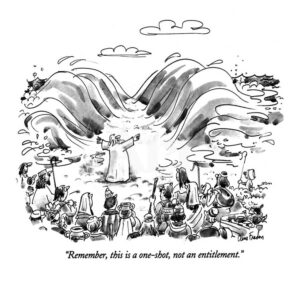 ‘People have all kinds of absurd ideas these days. Like the seventh son of the seventh son. They believe in the Abominable Snowman and the Loch Ness Monster. They believe that four-leaf clovers, horseshoes, copper bracelets, tooth fairies, wishing wells and rabbit foots will bring them good. They believe in fairies at the bottom of the garden. ’
‘People have all kinds of absurd ideas these days. Like the seventh son of the seventh son. They believe in the Abominable Snowman and the Loch Ness Monster. They believe that four-leaf clovers, horseshoes, copper bracelets, tooth fairies, wishing wells and rabbit foots will bring them good. They believe in fairies at the bottom of the garden. ’
‘ As for Mrs Buck or whatever she calls herself nowadays she should know that God created women from the rib of Adam, that her ordained role is as homemaker and mother to her children. Convents tremble at the thought it could be otherwise. Rumour has it she and her new husband might turn to a surrogate mother to bear their baby. The Church forbids this practice.’
‘It’s a good thing they didn’t have that rule when Jesus was born.’ I thought.
‘I’m told she wrote a book about a female sculptor who chooses a career over her husband. She should hang her head in shame. She has no respect for herself or the sanctity of marriage and has trampled on it, choosing to abjectly remarry the very day her divorce papers came through.’
‘In the eyes of the Church, two rites making a wrong.’
‘She must think husbands are like Kleenex tissues, soft and disposable. She never lets her sheets cool down before she brings someone else into the bed. I hear she even bought a drip-dry wedding dress. What does she think monogamy is- a type of wood?
‘Maybe,’ I thought to myself, ‘ for many it sounds too much like monotony. If ‘I am’ is reportedly the shortest sentence in the English language, could it be for that demographic ‘I do’ is the longest sentence?
‘How can she ever live this down? It’s contrary to the Scriptures.. For us in the true tabernacle, we cross our hearts and hope to die. Marriage is an iron-clad contract you can’t just break at will. It was ordained for the procreation of children to be brought up in the fear and nurture of the Lord, and to the praise of His holy name. Marriage is made in heaven.’
‘So are thunder and lightning,’ I thought.
The Church cannot make exceptions in its public solemnization of marriage without compromising its witness. Woe betide those who sin by such erotic vagrancy, yearning to satisfy their carnal iusts and appetite like brute beasts that have no understanding,” he whined on, bending my ear, thus implicating one of my esteemed aunts who he would have considered had transgressed in this way. “Those who knowingly violate this law of the Church are thereby ineligible to receive the sacraments including the Holy Communion we share,” he pontificated. They are committing mortal sin. If they die with this on their soul they will go straight to hell, cast out from God’s love and denied the sight of him for all eternity.’
‘Eternity’s a terrible thought… I mean, where’s it all going to end?’
‘That is decided on Judgement Day. If a person is found to believe in Christ they will go to everlasting bliss with those who reject Christ going to everlasting condemnation, never to see their heavenly father. ’You wouldn’t like that, would you’.
“Not by the hair on my chinny-chin-chin. What can one do to avoid such a penalty, Father?” I asked. “The couple must seek a dispensation through the Sacred Rota, the church’s supreme court. Only it can decide on such matters. Only it can issue an annulment. If they walk away from this ruling they risk being excommunicated”, he concluded his jeremiad with.
Sweet Jesus, the idea of my aunt being subjected to such mumbo-jumbo led me to hold such an archaic procedure in derision. How in the name of reason can it be sinful for a man or woman to live with the one they love? People should be free to marry whoever they want and call it quits whenever it’s on the rocks. They should be honest and come clean. Instead of standing in front of an altar saying ‘Til death do us part,’ they should just go, ‘I’ll give it a shot.’ How on God’s green earth can anyone else – especially someone who’s never been married – demand a relationship driven by messy incompatibility be maintained at all costs.
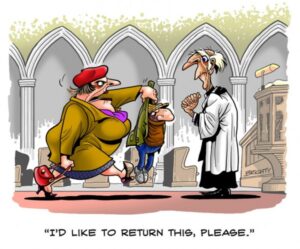
It was one thing for a man or woman to resist an aspiring partner’s advances. It was another to block their retreat.
The idea of a woman’s feelings about pregnancy was dependent on her marital status. The strict taboo against love outside marriage even extended to the medical profession.
One of the local Catholic medicos entered a consulting room where a young woman back from Sydney to reconcile with her family was sitting. ‘Good news, Mrs Smith!’ he said.
‘Miss Smith, ’she replied.
‘Bad news, Miss Smith,’ came his reply.
The advice his practice dished out to women in the family way was short and simple: If you want to stop this happening again—’
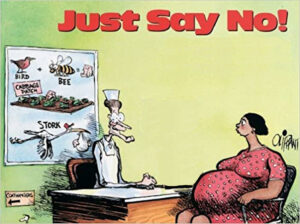
As for the annulments these struck me as being economical with the truth somewhat, as akin to the sale of plenary indulgences, with similar effect. They allowed Catholics who had once gone and got married in good faith to claim that they hadn’t done so, to gainsay these marriages – despite their vows and often the existence of children – rather than admit their error without cutting the hem off truth’s garment, and make a clean break.
Curious to know how the Church was going to stop people leaving, ’I asked the priest, ‘How can the Church convince people to follow its rulings?’
‘It’s simple. We need a government like that in Spain to set the lead and enforce our laws. One centred on the Church, ’ he declared, full of fire and brimstone.
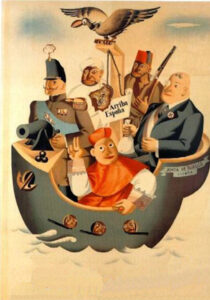
‘Not on Communist manifestos. We need to remove these repellent Reds from God’s sight.’
‘They didn’t destroy all the churches in Spain,’ I told him. I’ve seen pictures of lots of them in books.’
‘They rebuilt many. I say if you’re looking for nice new churches, go to Spain. If you’re looking for sin, go to hell!’
The priests and nuns had a very dim view of the Communists.
They were convinced Soviet forces were injecting propaganda into the school system.
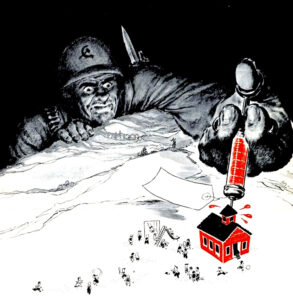
Public school teachers motivated by a deep hatred towards God were openly pushing their distinctly simplistic view of tearing down the Church.
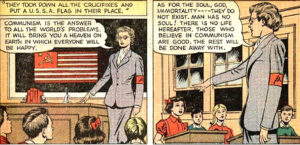
I came across a pamphlet in the presbytery produced by the Catholic Catechetical Guild Educational Society. It was part of a “Red Scare” in the U.S. that raised fears about the horrors of a communist takeover.
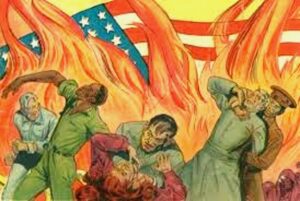
In primary school The Sisters of Mercy gave us comic books depicting them as sinister figures skulking in the shadows.
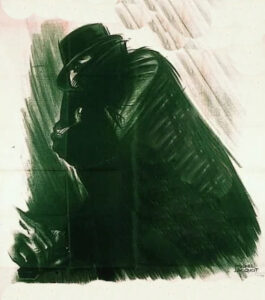
As mass murdering slicksters.
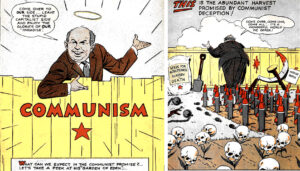
‘We have to have a firm hold on what people can read, see and do. Women used to respect themselves. Now brazen hussies flirt, flaunt their ankles and bosoms shamelessly in the street. They smoke, wear immodest pants, go rutting and get knocked up. The Church has a duty to protect the vulnerable from this fascination with the materialist. This so called rock and roll that inflames the passions with its pelvic thrusts, leg sliding and debased body grappling. So many occasions of sin multiplied beyond our imagination. We live in this world, not of it. We need Catholic rules, not Rafferty’s rules, to clean up the cesspit people are exposed to. ‘It’s God’s will.’
‘And you’re doing your best to back up your vindictive version of him,’ I thought.
‘Like Franco we have banned the outrageous film ‘Viridiana’. The Holy See supports us It has denounced it as ‘blasphemous.’
‘So there’s a superior being,’ I thought, ‘someone who can make the mountains, the oceans and the skies, but who still gets upset about something someone said. He’s an all-powerful being, would he have such self-esteem issues?’
‘If God doesn’t destroy the studio responsible, he owes Sodom and Gomorrah an apology,’ the cleric rambled on.
‘The film’s distributors should pay for an exorcist,’ I suggested. ‘That way they won’t get repossessed.’
It’s got a “Last Supper” scene featuring crude, ruthless stumblebums and gorging, guzzling poofs in place of Jesus and the apostles. What sacrilege!’
‘O ye of little faith!’ I thought. His doubt didn’t fit in with a biblical admonition I had read: “But when you give a banquet, invite the poor, the crippled, the lame, the blind, and you will be blessed.” (Luke 14:13. It didn’t fit in with the view of St. Lawrence that such persons were the treasures of the Church. It didn’t fit in with the story of the Good Samaritan which urges us to tend to our neighbour when he or she needs help.
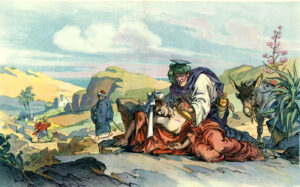
‘Father,’ I said to the priest, ‘We should only look down on the wretched of the earth when we reach down to help them up.’
Our Lord and Saviour always wore sandals and he never married. And he had twelve disciples and I don`t think any of them ever married. And the apostle Paul, he was a Iifelong bachelor. And you never heard anybody in the New Testament say that they were a bunch of ‘poofs’.
I wanted to take the priest on over what I felt was a departure from christian values, but being young and inexperienced I bit my tongue.
I settled for asking him as he ponced about, telling people what to think, what he thought of the changes being brought about by Vatican 11.
‘These changes are shaking our faith. Members of our congregation are settling for shallow convictions. In some places they are turning the altar around to be closer to the people. Pop music is making it’s way into churches. They are switching from Latin to the vernacular. Like with the Protestants, things are becoming more secular.’
The old priest was a chain smoker, sometimes in the habit of smoking several cigarettes in succession, using the ember of a finished one to light the next.’
‘That’s very risky,’ I said to him.
‘Risk is a part of smoking. Take that away, what have you got?’
‘Lymph nodes,’ I answered.
One morning after he had officiated, one of the elderly mentally muddled nuns saw white smoke billowing from out of the sacristy. ‘We must have a new pope!’ she called out.
This priest spent an increasing amount of time reading the bible while puffing away. The way I saw it he was cramming for his final exam.
Before he left for good, I bid him adieu. ‘I’ll be sorry to see you go, Father. I didn’t know what sin was until you came.’
These control freaks were All At See. This wasn’t how the Jesus I had in mind thought of the lowliest-those he called his brothers and sisters. True, some frowsy tramps on the turps I had encountered were not fun people to be with the closer you edged up to them. B.O. Plenty, named after the Dick Tracy character, who humped his bluey, sleeping under Cohen’s bridge in Gunnedah came to my nostrils. Smelling like a brewery, his breath could kill a fly at fifty feet. The story went he once looked at the sign ‘Cleaning and Dyeing above the dry cleaners and commented ‘I always knew these things went together.’ However, I didn’t see ending up in this condition as simply down to them. The biblical accounts I had read of ‘The Bread of Life’ depicted him time after time reaching out with compassion to those at the bottom of the social pyramid—the necessitous, the helpless, women, Samaritans, lepers, children, prostitutes, tax collectors and all kinds of social outcasts.
Had the priest had forgotten what we had been told about Jesus’s sayings. That the last shall be first and the first shall be last. That we must feed the hungry and clothe the poor. That it is easier for a camel to pass through the eye of a needle than for a rich man to enter the kingdom of heaven.
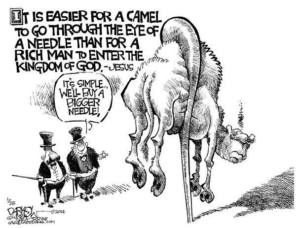
I knew for a fact even outcasts can place their hope in the Almighty even if they’ve fallen from a state of innocence.
B.O.Plenty bought a few bottles of the fermented forbidden fruit from our store one day and put them in a bag, But then he realized that if he fell over, the bottles were going to break and the heavy duty cider would be gone. So he decided not to risk it and drank the whole bottles right then outside our store.
Having noticed he was a bit wobbly, I asked him when he came next if he would have been better refraining from drinking it until he got made back to his camp safely.
‘Thank God I had it while I could because I fell over six times on the way home.’
Feeling the wrath of grapes, B.O. shuffled into our store’s off licence another day to buy a small bottle of red wine. While he was fumbling for his coins, I said to him, ‘It’s not my business but you shouldn’t drink so much. Don’t be ashamed to talk about it. Don’t you think that red ned’ll bring you down as you age?’
‘Wine improves with age. I improve with wine.’
‘What do you have to thank for your drinking habit?’
He replied, ‘A woman drove me to drink and I didn’t even have the decency to thank her.’
After rifling through his pockets, he finally came up with the required amount of coins. Jack slid the bottle in his back pocket and started out the door, a little unsteadily I feared. Checking to see he was walking O.K., I saw him go just a short distance when he slipped and fell heavily astern. Struggling to his feet, he looked at the wine trickling down his leg, not yet sure what it was. ‘Please, God,’ he implored, ‘let it be blood!’
When the ambulance took him to Gunnedah District Hospital, he decided to play up his injuries to take advantage of a clean bed with a full meal service. On visiting him, unsure of his denomination, Monsignor Leahy asked him for the purpose of anointment, ‘Do you believe in the Father, the Son and the Holy Ghost?’
‘What is this. Here I am dying, craving that sacramental wine and you choose to ask me riddles!’
‘He is all of the above. He is all three rolled into one. Do you understand?’
‘I’ve been as dry as a derelict dingo camped out on the Common. Of course I understand. I’m a strong believer in spirits.
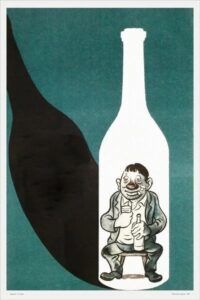
I know Jesus, the Son, was turned away from a fancy pub: ‘I don’t care who your father is mate, you’re not getting in with sandals on.’
I inspired visions in some of the clergy I might be ordained with a vocation, to give myself to a higher purpose, my life an ‘instrument’ for God’s will. Monsignor Leahy told me, ‘For the Israelites, God parted the sea. To Moses, he spoke from the burning bush. The Lord has spoken to me and he will speak to you. Allan, expect a sign and God’s wisdom will be proven to you too.
I became lost to the world in Church history. I even wanted to become a Church historian until I realised there was no future in it.
At one altar boy’s picnic, I was assigned to rotating the various cuts on the gridiron.
And then there was a hideous wailing and gnashing of teeth. And the air was filled with smoke and flame.
Monsignor Leahy insisted the meat cook slowly for a long time. Too long to stay tender. ‘Oh no’, he cried as he realised his mistake, It’s as tough as old boots!’
As the dripping fat and bloody juices sizzled onto the coals underneath, Colin Sills, my fellow altar boy said to me: ‘Hey, Allan I’ve been thinking—’
‘I thought I smelled something burning.’
‘I’ve been thinking about who my favourite saint is. Who’s your, Al?
‘Nearest and dearest to my heart is St. Lawrence, patron of cooks, chefs and comedians.’
‘Well, If God created us in his own image and according to his likeness and is watching us all the time, he must expect us to serve him fine entertainment.’
‘As deacon in Rome, Lawrence was charged with the responsibility for the material goods of the church and the distribution of alms to the poor. I came across him when I was flipping through the missal to see the different saints’ feasts. Now that’s a saint if ever there was one. In one of their crackdowns, The Romans demanded he render to Caesar what was his. The lot. But there was nothing to give. Having gotten wind of their demands, Lawrence had sold the sacred vessels, golden candlesticks and other treasures and given the proceeds to the poor and needy. So the Romans put the heat on him. They “roasted” him alive ‘by inches’, little by little on a grill.’
‘A burnt offering you might say.’
‘To the faithful his burning flesh emitted a sweet, pleasant smell. To the unredeemed it was noxious. He kept his good humour to the end. So vehement of possessing Christ, he is said to have made his famous cheerful remark, “Turn me over. I’m done on this side.” Then after being turned, he declared ‘I am well baked. Whether better cooked or raw, make trial by a taste of me. Now if that isn’t chutzpah, I don’t know what is.’
‘Do we know if the prefect took him up on his offer? ’
Imbued with the spirit of St. Lawrence, I added my own postscript to the legend: ‘The prefect did make trial. After rolling a large bite around in his mouth, he said, “Umm, love them crispy Christians. You know, I’m converted. Until we barbecued this deacon, I just couldn’t seem to get a tender Christian. I’ve baked them, I’ve roasted them, I’ve stewed them. I’ve tried every sort of marinade.
The second prefect asked, “What kind of Christian have you used?”
The first said, “You know, the ones with those brown cloaks, a rope around the waist and a tonsured scalp.’
“Ah, well” the second prefect replied, “no wonder … those are friars!’
‘Now pass me your plate, Colin. Are you ready to eat?’
‘ Am I ever! You must have read my mind.’
‘Ready for some short ribs? Sausages? Divers tongue? Eye fillet? How would you like them? Rare, medium or well done?’
‘Ah, I think I’ll pass. I’m on the light side of the raw. I’ll settle for a cheese sandwich. I’m feeling a little unredeemed right now.’
I became interested in the different orders. It was my reading The Three Musketeers that sparked my interest in the Jesuits.
‘One of them, Aramis is a Jesuit novice’, I told a trio of my fellow altar boys. ‘He is preparing for his ordination to the priesthood.’
‘We’re just like the Four Musketeers, aren’t we?’ said Paul, one of our novice acolytes,
‘fighting duels with hairy ticks and overcoming confusion.’
‘Shouldn’t it be ‘The Three Musketeers?’
‘Four if you count D’Artagnan.’
‘Well, nobody knows how many there were, really, do they, Paul? After all, history’s a sketchbook. You do know that The Three Musketeers is a fiction, right? Written by Alexandre Dumas.’
‘A lot of people are saying that about the Bible these days.’
‘What, that it was written by Alexandre Dumas?
‘That’s a laugh, Allan. Everyone knows it was written by Jesus.’
I was interested in how the different orders treated heretics.
“Do the Jesuit and Dominican Orders have similarities? “I asked Monsignor Leahy, one of the parish priests renowned for his wit.
He replied, ‘Well, they were both founded by Spaniards — St. Dominic for the Dominicans, and St. Ignatius of Loyola for the Jesuits. They were also both founded to combat heresy — the Dominicans to fight the Albigensians, and the Jesuits to fight the Protestants.’
‘What is different about the Jesuit and Dominican Orders?’
‘Met any Albigensians lately?’
I was curious to find out more about this French religious sect exterminated for heresy during the Inquisition and other nonconformist groups. Gnostics, Manaechists, Arianists. All came under my microscope and I discussed them keenly with my fellow altar boys. So much so, it started to get on Tom Leahy’s nerves.
‘Sects! Sects! Sects! Is that all you boys can talk about,’ he complained. What’s wrong with Rugby League?’’
I was led to the realization how institutions and their representatives can be less likely to be offended by a separate group with a separate name, holding views different from their own, than they are by a group claiming their own name holding different views. Rugby would always mean Union, never League. And League would mean much more than Rugby.
‘Allan, said Monsignor Leahy, ‘let me inform you of an ongoing dispute going on inside the Church right now. It started small, but is now getting completely out of hand. It’s over whether the language used in the mass should be Latin or the vernacular. The argument is incredibly bitter. There are people who are not talking to each other. There are people who are threatening to leave the Church unless they get their way. Family relationships have been destroyed.
One priest in Ireland hasn’t known what to do, so he found out that one of the founders of his church, old Bishop Delaney, is still alive in the church’s retirement home. He sat on the porch in a wheelchair when the delegations for each viewpoint paid a call. Before the bishop could complete his opening pronouncement, one of the partisans bursts forth: ‘Bishop Delaney, Your Excellency. isn’t it the tradition in our church that the mass can only be celebrated in Latin so as to show our respect to God?’ After a couple of seconds passed, the Bishop just shook his head slightly and said ‘No.’
So an advocate from the other side said: “So, isn’t the tradition in our church that the mass be celebrated in the vernacular to show our humility before God?” The bishop shook his head and again said ‘No.’
The priest and the rest of the delegation looked at each other. Finally the priest said, ‘Your Excellency, that can’t be right. It has to be one or the other because the parish is tearing itself apart. There are people who hate each other and families that aren’t speaking to each other and we’ve practically got fist fights in the parking lot. We’re just constantly at each other’s throats.’ And the old bishop smiled, nodded and said, ‘That’s the tradition!’
‘What both sides failed to recognise, Allan,’ said Monsignor Leahy, is that whether the Mass is in Latin or the vernacular—it’s the same Eucharist that unites the Church-not the language.’
Monsignor Leahy suggested I might follow in the footsteps of Cardinal Spellman. ‘Like you, this humble, angelic boy with a humble wish to serve God, worked in his father’s grocery store and served at the altar. He shares your interest in archaeology. His Eminence is keenly interested in Church history and preservation of its sacred sites’, the Monsignor apprised me. ‘One of his pet projects involved the underground discoveries at the Basilica of Saints John and Paul, this holy of holies.’
During his long tenure in New York, The Cardinal had become known as ‘The American Pope’.

He was military vicar general of US forces during World War II.
He sent New York priests to support and to march alongside Martin Luther King in the civil rights marches in Selma and Montgomery. He attacked racial discrimination, when applied to public housing. He blessed members of the air force crews before their bombing flights over German armament facilities.
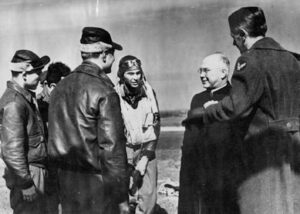
He would appreciate my thoughtful consideration in his regard for this service.
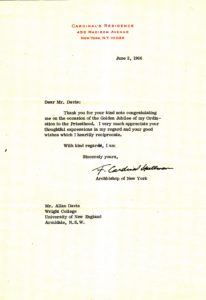
I didn’t know at the time, however, that he didn’t appreciate the gentleness and humility of John, the new Roman pontiff. This benign pope had a different agenda, renouncing the vain pomp, cant and glory of the world, favouring a spiritual revolution rather than temporal matters of politics. In his encyclical addressed to ‘all men of good will’ he instructed that every human being has the right to worship God in accordance with the right dictates of his own conscience and to profess his religion both in camera and in public. This was a repudiation of the Catholic strain of exceptionalism-the insistent cry by armies, crusaders and inquisitioners throughout history that the Mother Church was the one and only true religion. He taught that age-old animosities with Protestants must end, even when faced with anti-Catholic bigotry. His ‘Mater et Magistra Encyclical’ took Catholic social thought expressed in Pope Leo’s ‘Rerum Novarum’ and brought it up to date by suggesting that government had a moral duty to provide welfare, health and education services, services for the poor and handicapped, and that democracy was the best governmental form to effect such justice.
To mock Pope John’s wish to be seen as ‘pastor and mariner’ it is said Cardinal Spellman filled a boat with sheep and sailed it along The Tiber. Looking down his nose at him, he is said to have scoffed: “He’s no pope – he should be selling bananas”.
Then there were stories told of the Cardinal himself at his expense. One I would hear later from Russel Ward, tells how Archbishop Mannix of Melbourne had been lobbied at a conference in 1939 by the then American ambassador to Australia. Pope Pius 11 had just died and the U.S. State Department was working hard to have the ultra conservative Spellman elevated to the throne of St. Peter as the first American Vicar of Christ. In pursuit of this end the ambassador, Pete Jarman, spoke long and eloquently to the Archbishop who replied with only the occasional non-commital grunt. Mistaking reticence for assent, the ambassador finally said, ‘Of course, Your Eminence, there may be some difficulty in finding a suitable name for our man.’
‘Oh no, Your Excellency,’ replied the archbishop, ‘we could always call him Bolonius the First.’
I felt myself to be in the same boat as the kindly pope.
Unschooled in the byzantine ways of the Vatican power structure at the time-and even later- and the role in ecclesiastical intrigue played by God’s Field Marshal on Earth, I was just a kid helping my parents sell -amongst other things- lots of bananas. Growing quickly I knew a few things for sure. Time flies like an arrow. Fruit flies like a banana. And I would learn that officiating in the Church doesn’t make you a Christian any more than standing in a garage makes you a car.
Approaching the age of reason, I would become painfully aware of the hardline conservatives in the church when I attended the local parochial schools.
The Holy Family
As had the Kennedy brothers from Boston. Monsignor Leahy lionized their clan as the Catholic ideal. His admiration was understandable. They were a gift to the media, the raw stuff of legends, perfect grist to the image making mill. In a hormonal manner of speaking, I had my mind to sharing their vocation, joining women, not men in frocks. Like many I read myself into the lives of these handsome ambitious men and their glamorous wives, all in their prime, all polished, buffed and shining, intended for larger things. This was an image of splendour and high calling, of succeeding in places once believed out of reach. The social register. This carefully nurtured image became firmly lodged in my mind.
‘Jack Kennedy’, the monsignor said proudly of the eldest son, ‘is tipped to be elected as the first Catholic to the American presidency. We pray a puff of cigar smoke from the White House will confirm this. This could break the stranglehold of power there that is heavily weighted against ‘left footers.’. He’s a good Catholic role model, from a family to which everyone might want to belong. As a layman in the American church their father Joseph is out of the box. His wife Rose is a saintly mother devoted to the care of their intellectually handicapped daughter” he said.
‘I’ve read about her, I replied. She spoke publicly about her profoundly retarded daughter. ‘She was encouraged by the example of Pearl Buck. Mrs Buck wrote about the same cross her own daughter had to bear. Praise be. Her book ‘The Child Who Never Grew’ led me to understand mental illness better.”
“Is that so?” replied the Monsignor, seemingly taken aback, “I didn’t know they had common cause.”
I wasn’t sure what to say so said an emphatic nothing.
‘Although Joseph Kennedy has made a pretty penny” he resumed,” he measures his success by the kind of family he has raised. They’re one big happy family – dedicated to each other as well as to the Church. They’ve given their nation and ours a sense of moving forward toward great things. They’ve brought to our life a culture, a refinement, a meaningfulness, that we have not known before. They have received the personal benison of the Pope and have always enjoyed the trust and close friendship of Cardinal Spellman.
‘I trust His Holiness received some holy venison,’ I said.
‘You’ll be interested to know that Joseph Kennedy has kept the digging at the basilica moving along. He has chucked in some generous amounts. Relics play a large part in the life of the Church, you know, Allan.’
‘Amen to that Monsignor, amen, ’I replied, the homily from the sanctimonious antiquity fresh in my mind.
I counted myself in this broad constituency of the great young white hope, wanting to mingle amongst the ‘in-crowd’-the swells, the jet set, the black tie artists, writers, scientists, glitterati and cognoscenti at the ritzy inaugural gala. On the other side of the purple rope, lightbulbs popping, lots of pizzaz. I too wanted to be elegant and sophisticated, with poetry on my tongue and a radiant woman all in white, smothered in mink, on my arm. I’d take her hand, kiss it and lead her on the floor.
I wanted to be considered an important person one day. Not ‘very ‘ but ‘just enough’.
Somebody who knows what is talking about .
Somebody who knows what’s what.
Somebody who knows what he is doing.
Somebody with his finger on the pulse.
A distiller of information.
An extractor of essence.
A purveyor of knowledge.
An arbiter of taste.
A man of his word.
The Woman in Black
Nudging me along gently in this direction was the radiant lady sitting at my side after school. Dressed in black with ecclesiastical severity from the top of her head to the tip of her toes save for her white bib. My music teacher, Sister Aloysius. Not a widow but a bride of Christ.
With her hands in her sleeves she usually walked slowly, gracefully, never in a hurry, keeping her eyes down so as not to be distracted from the Lord.
She imagined herself flying up in the sky, next to Jesus, as Waldemar von Kozak would imagine.
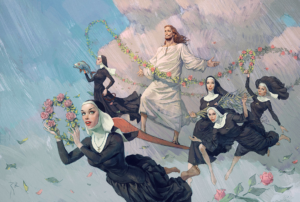
‘The Catechism teaches that we nuns are mystically betrothed to Jesus Christ. As a girl I had this sense of him being a tender God, calling me. In our actual marriage ceremony, we novitiates dress in white and make a public vow to the Church. After this we must consecrate ourselves to God “until death”.’
She was often called on to play Felix Mendelssohn’s ‘Wedding March’ at marriage ceremonies.
‘Why are Wedding Dresses white?’ I asked her.
‘Most people associate the color white with innocence and happiness.’
‘Not Maria’, I said, referring to the heroine in ‘West Side Story, which I had mentioned seeing. ‘She wasn’t happy about her white dress-and she worked in a bridal shop. Her communion dress was being altered into a gown for the big dance. When she tried on the plain white dress with a wide red belt, she complained: ‘White is for babies.’ However, after trying it on, she became ecstatic: “It is a beautiful dress!” What I neglected to add was that Maria had begged for the neckline to be lowered one more inch as she slightly pulled down on her own bodice: “How much can one little inch do?”.
Her name as hard to spell as the life she led, ruled by silences, bells and the metronome, Sister Aloysius combined that essential reserve, delicacy and understatement that is expected of a nun, with a vivaciousness and boundless enthusiasm for all things musical. ‘Music is a language everyone understands’, she told me, ‘Whatever you want to say best, say it with music.’
‘Beautiful music’, I added, as had Irving Berlin. This jewish musical genius had taken the blood out of of Easter and made it about fashion, taken Christ out of Christmas and made it about the weather. Plink, plank, plunk, Mum played Irving’s songs at home of an evening when we gathered round the piano. Simple melodies, ones with good old fashioned harmonies.
Other popular standards Mum played included Ain’t Misbehavin’, Blue Moon, Jeepers Creepers and I Can’t Give You Anything But Love. ‘Can you believe, Allan, all great hits featured in the one musical Swingin’ the Dream. One of the musical’s new compositions, Darn That Dream, became a hit when it was released by Benny Goodman’. Goodman had joined famed jazz pianists Fats Waller and Count Basie to create the sound . Louis Armstrong also appeared in the show.
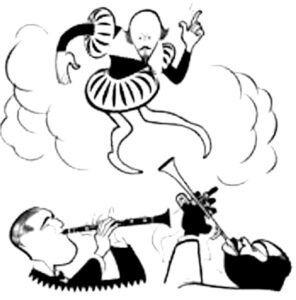
It combined swing music with Shakespeare and brought in elements of Felix Mendelssohn’s famous Wedding March.
With her rallying benedictions Sister Aloysius worked on me, this so so soprano, to sing in the local eisteddford. She brought to me my first acquaintance with the distinctive, incisive colours of the church organ. She invited me to be her learning companion while she practiced it in the church. ‘It’s time you learned about the king of instruments. It’s ideally suited to accompany human voices.’
She used it to accompany the choirs, inspire the congregation in their singing, and generally to enhance the liturgy. ‘ It powerfully lifts up man’s mind to God and to higher thing’. First and foremost she taught me piano.
I found limb-hand independence, playing with my hands together, doing two separate things at once, challenging to a fault.
Even when both parts were incredibly simple and I could sight read both lines mentally easily, I started playing and my hands just locked up.
‘You’ve mastered the important scales and learned the prominent chords with your right hand. On the other hand you have different fingers. To co-ordinate your hands, try and play something using the right hand, and slowly moving your other hand at the same time. Take your time, child of light, don’t rush it. And above all practise, practise, practise!
Make use of the metronome as you can practice coordination at different tempos.’
One of her favourite solo piano pieces was Prokoviev’s Romeo and Juliet based on his ballet score. She shared my infatuation with Shakespeare’s timeless tragedy, the tale of two ill-fated lovers thwarted by circumstances beyond their control. I told her more about my favourite re-telling, the musical ‘ West Side Story’.
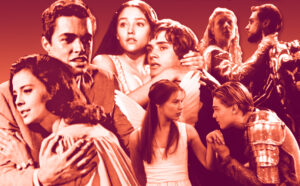
I presented her with a vinyl record of the movie soundtrack. It’s iconic red and black cover depicted apartment block fire escapes in New York.
‘One of these takes the place of the famous balcony in Shakespeare’s drama’, I said. ’The outlines you can see are Tony and Maria, the star-crossed lovers, in dancing pose, declaring their love for one another.
‘I recall Laurence Olivier and Peggy Ashcroft playing the same roles, Allan.’
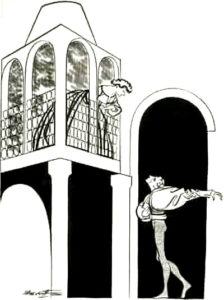
Two of our sisters saw the house and balcony associated with the story in Verona during their pilgrimage to the Vatican.
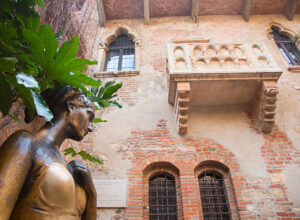
I hope some day you’ll be able to see Bernstein’s interpretation, Sister. It’s a true marriage of drama, opera and ballet. Saints alive, it’s got everything- sheer visual excitement, a score heavy with jazz and Latin-American rhythms , music that pulses and soars, superb ballads, restless, dizzying dance steps, bodies high-stepping, leaping, tumbling, rumbling, spinning, flying wildly through space, flickknife fighters chest-puffing, fist-clenching , looking and sticking, switchblades a-picking, chins pointing jeering and snorting, crouching slithering and springing. It’s a a feast for the eye, the ear and, ultimately, the heart.’
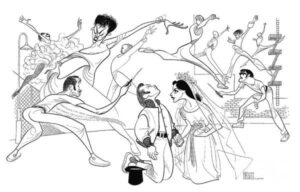
‘What’s it all about, Allan?’
‘This powerful real life tale uses the street-smart slang of teenagers, skillfully updating Shakespeare’s plot intricacies. It’s set in the plug ugly tenement slums of today’s ‘Big Apple’. The ill fated lovers struggle to exist together in a concrete jungle of violence, hate and prejudice. The theme of love defeated is widened to that of society rent asunder.’
‘ It could be widened to that of our world divided into two , into East and West.
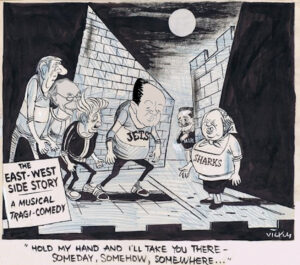
Who are the main characters?’
‘Tony, a Jet. and Maria, a Shark, find themselves caught between not rival families but rival street gangs of different ethnic backgrounds. The native born are the ‘Jets’ and the Puerto Ricans are the Sharks, the sons of less recent immigrants. In a fight to the death over who will control the neighborhood, the Jets, the “American” hoodlums, want to resist newcomers setting foot in their territory.’
‘Our Sisters in New York write about this savage brawling,’ said Sister Aloysius. ‘Some of the bigger ruffian schoolboys give them the collywobbles. Knife fights are a fact of life in their dioceses. A young punk pulled a knife on one of the Sisters recently.’
‘She must have been terrified.’
‘She stayed calm and pulled it together. She could tell he was new to the game. The knife had butter on it.’
‘The musical is relevant then,’ I said. ‘It makes points in its description of the hell to pay when youth are devastated by poverty. It deals with social problems, particularly those faced by immigrants, grappling with the difficulties of assimilating into a different society. They have mixed feelings about their new country, alternately excited or with their heart in their mouth. In ‘America’, its praises are sung to the skies. But the streets are not paved with gold. The land of opportunity is also one with a history of racism and discrimination.’ ‘By all that’s holy, it sounds very heart-breaking’, said the nun, after she had listened to the album, ‘and also very instructive artistically. The tension and suspense are reflected in musical terms. Bernstein displays a motif prominently throughout the entire musical, a common musical device called the tritone -also known as the augmented fourth, or diminished fifth.
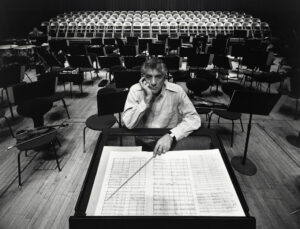
You can hear it in the reiterated word, ‘Maria’, in the song. Try singing it.’
Breathing in deeply, I sang the three syllables:“Ma-ri-a: I’ve just seen a girl named…’’
‘It’s hard, isn’t it. It plays on so many rhythms, almost on just that name. Three notes pervade the whole piece and in the overture and all of the fight music -“The Rumble”. It comes out in ‘Cool’ and as the gang whistle -in “Prologue”. The same three notes. The interval is dissonant, It sounds jarring, restless, unsettled and creates musical tension. It’s something that yearns to be resolved into the next note. It’s also quite exciting. By embracing the musical disunity created by the tritone, Bernstein provides a musical representation of how Tony, Maria and the opposing gangs feel.’
‘It triggers off all kinds of feelings, I said. ‘Bernstein is known for being a tension seeker.’
‘As God is my witness, music has a powerful subconscious effect,’ she replied. ‘Certain notes can stir certain internal reactions within the listener they may not even be aware of. Today the tritone is used in films and theatre to suggest an “oppressive”, “scary”, or “evil” sound. It used to be nicknamed ‘The Devil’s Interval’ hundreds of years ago. Some considered it most “dangerous”, being associated with sinister things, mainly Beelzebub.’
‘Some in the Church see the devil in all kinds of places I’ve noticed. ’Especially where there’s fire.’
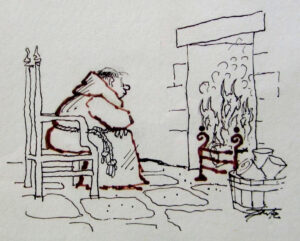
’’In medieval theology you had to have some way of presenting Satan. Or if someone in the Church wanted to portray the crucifixion, the tritone would once in a while be used there.’
‘What you might call uneasy listening.’
‘The Church didn’t regard it in accordance with canonical rules. It discouraged use of this particular dissonance. It was seen as wrong when it came up in choruses of nuns and their ascetic brothers.’
‘Felonious monks.’
‘Especially when their sounds were heard as melodious thunks. If I had been teaching you then, I would have told you that it simply doesn’t work technically and was to be avoided like the plague. There were stringent musical rules.’
‘More honoured in the breach than in the observance, I daresay. What would have happened if you had broken these rules?’ I asked.
‘There were rules for getting around it. Church history is full of compromises. There’s a lot of them happening now. You know how I wanted the Church to open up to new ideas after the death of Pope Pius.
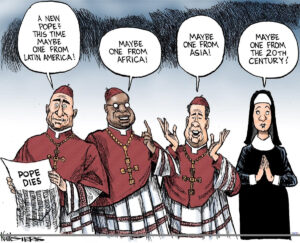
Pope John is bringing us up to date at last. Some say that singers were cast out, bell, book and candle, or otherwise the Church came down on them for invoking this interval. This notion is likely fanciful. The tritone is just another color in the musical palette. You can’t ban it. It’s a natural and expected component of our music.’
“Let everything that has breath praise the Lord!”- Psalm 150:6.
One day Sister Aloysius led me up the stairs at the rear of St. Joseph’s to the gallery and approached the organ console.
‘As with the tritone the organ has occasioned some misgivings in the eyes of the Church. The sound generated by the hydraulis- the first recognizable ancestor of the organ- was thought to be so terrifying that it was used at the ancient Roman circuses. At that time these were more of a horror show than family entertainment. A strong objection to the organ in worship remained pretty general down to the twelfth century.
‘Why was that?’ I asked.
‘It’s partly accounted for by the imperfection of tone in organs of that time. But from the twelfth century on, the organ became the privileged church instrument. The majesty and unimpassioned character of its tone made it a particularly suitable means for adding solemnity to Divine worship. Evolving over time It eventually worked its way into mainstream liturgical use. It hasn’t lost prominence.’
‘Sister, I read in The Catholic Weekly that Cardinal Spellman says the pipe organ is a treasure of inestimable value. He says it adds a wonderful splendour to the Church’s ceremonies. He’s raising funds for a new one.’
‘Whereabouts?’ she asked”.
‘It’s for the the Basilica of the National Shrine of the Immaculate Conception in Washington. One that will be a resounding memorial to the many deceased chaplains and members of the armed forces.’
‘What a fitting way to show this. Let me show you our resounding range of timbre,’ she said.
Sitting herself down, squaring up over the keyboard, she put her feet on the pedals, cracked her knuckles and began coaxing the organ to life. Slowly increasing in volume until a discernible melody breathed through a fluid amalgam of tones and harmonies.
‘Holy smoke’, I thought, She’s having a go at ‘Maria.’
‘Listen to it piano,’ she said, ‘just whispering: ‘Say it soft and it’s almost like praying.’ Pulling out all the stops, she continued to magnify the intensity of sound and, after several minutes, was pumping like crazy. Now listen to it fortissimo:’ ‘Say it loud and there’s music playing.’ Timbre! ‘Maria’ thundered throughout the hallowed space, filling the church with sounds of worship and praise.
I’ll never forget the thrill of those tricky tritones. As I recall they gave me goosebumps and set my heart beating. Sister’s playing could only be described as magnificent, the registrations dramatic. I found it devilishly hard resisting my eagerness to sing. Between stanzas of the song, Sister Aloysius played it by ear with the skill and artistry for which she was noted. The sound effect, the very best ‘cos the church was empty, was all that I had imagined and more besides. I was in awe until I noticed that it we had some company. Monsignor Leahy, open mouthed, was gazing up at us from the sacristy. What was going on in his mind? After Sister packed up playing, he started walking along the aisle, to the staircase. O dear, was he unnerved, coming to register his displeasure?
‘What is that you’re playing, Sister?’, he asked, as he climbed up to join us in the loft. I’ve never heard anything quite like this before in our church.’
‘ It’s ‘ Maria’, Father. Do you like it?’
‘Bless my soul, I don’t like it, Sister. Hallelujah, I love it!’ he said, his eyes sparkling. ‘You must have a direct line. It’s sublime. It transcends the merely human sphere. It evokes the divine. It’s musical testimony to the composer’s obvious devotion to the Blessed Virgin.’
When he left, I confided my fear to Sister about how this secular piece composed by a worldly New York Jew might have gone down with him. ‘I thought he might have found it unfit, unpleasing, wanting to stick to the traditional hymns.’
‘Allan, you needn’t have worried. This majestic instrument is exactly that- an instrument and its uses are only restricted by the imagination of the organist who plays it. It follows, therefore, that an organ may be used to render traditional or contemporary styles of church music as they may be required. By the grace of God it gives resonance to the fullness of human sentiments, from joy to dejection, from praise to lamentation. By all that is holy it’s capable of echoing and expressing all the experiences of human life. According to present canonical legislation organ music is allowed on all joyful occasions. Other than for celebrating our love of the lord, what could be more joyful than celebrating the love of a man for a woman. And might I add your newfound love for this instrument, superior to all others. What could be more becoming for playing in the Church than ‘Maria’?’
‘Would you go to see West Side Story if asked, Sister?’, I asked her later.
‘I wouldn’t say no’, she said. ‘One day. It’s subject is not for the fainthearted-it is a tragedy after all- but-and I’m not placing them on the same level- like that of the death of Christ, what it draws out of it is beautiful. For all its sadness West Side Story ends on a positive note— with the idea that out of the vale of tears a better society can be created in which different groups can live together.’
The Altar Boys Picnic
The annual altar boys outing was the occasion on which the priests thanked us for our services with a splash at the local swimming hole followed by an outdoor spread and barbeque. One in particular presented me with an opportune moment to find out more about the Church’s views on the political hot potato.
‘Monsignor Leahy, The nuns warn us constantly about the devil and where he can lead us.
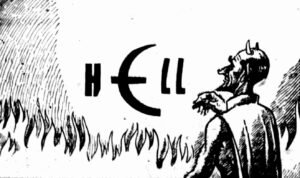
I see many articles in the Catholic Weekly that paint a diabolical picture of Communism. Some in the church see it as the devil incarnate.’
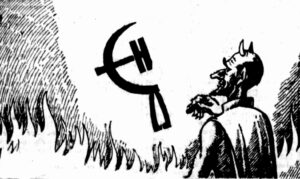
‘Of all the animals God created, the serpent was the most tricky and deceitful. Snakes and serpents take many disguises. Lucifer doesn’t necessarily stink of sulphur, have horns and a pointed tail. He may wear a fine red shirt and sing about brotherhood. But his horrid goals are still much of a muchness. To create a cauldron of hate.’
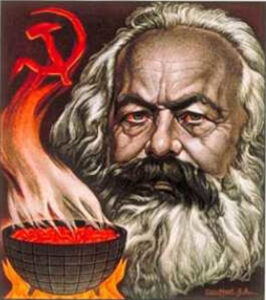
‘Monsignor, I read in the ‘News Weekly’ the Communists are planning to take over the world. Is that true?’
‘News Weekly’ was the Santamaria founded news-sheet which was available at parish churches after Sunday Mass.
‘Santamaria believes the advance of Communist world conquest through Asia has been planned along the axis of a line drawn from Moscow to Sydney. This line passes through China, Indo-China, Indonesia and New Guinea to Australia.’
‘At school the Sisters have given us comics. They show the Communists as sinister figures skulking in the shadows. They say they worship the anti-Christ and his false idols. What is it between the Church and the Communists?’
‘We are at loggerheads with Communism, Allan. We don’t go along with it for its pagan ideas and we fear what they have done to the Christian Church. They portray priests as manipulators who lure innocent people into their houses of worship so as to force feed them with the teachings of Jesus.
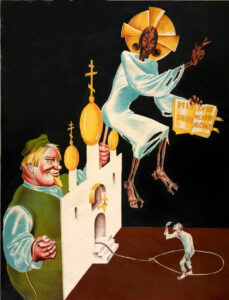
Communists don’t believe in the soul, in the afterlife. They don’t believe in the Trinity or the Virgin Birth. In countries under their military control the Russians ban ceremonies venerating the Virgin Mary.
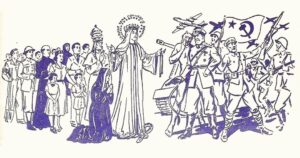
‘In response the Pope has consecrated Russia to the Immaculate Heart of Mary.’
‘Hopefully that will usher in a period of world peace.’
‘We can only pray for their enlightenment and conversion.
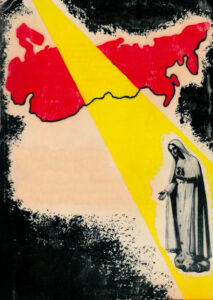
The problem is they believe that man is a physical being and nothing else. They have put the God-Man in place of the Man-God.’
‘What have they actually done to the Church? I asked.
‘Let’s look at their record. In the 20’s Russian priests disappeared in the gulags to the sorrow of the faithful. Their icons and churches were ransacked.
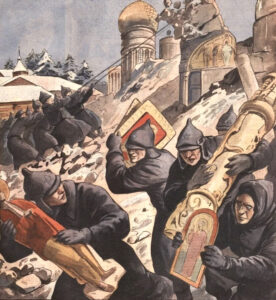
In the 30’s mobs looted convents and seminaries in Spain while crowds looked on and cheered. Religious properties were torched and desecrated in this mad rampage. Our most sacred symbols, our crucifixes, were seized and torn apart.
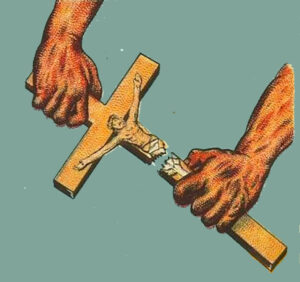
Archbishop Duhig feared that the Republican measures were part of a universal pattern. He said: ‘Yesterday it was Russia and Mexico; today it is Spain.
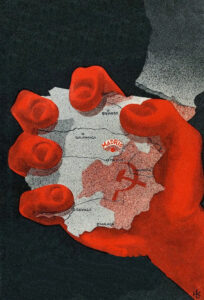
Tomorrow it may be Britain, and the day after, Australia.’
‘Monsignor’, I said, ‘Don’t you think some of this trembling fear led to unnecessary alarm. To some real howlers. I’ve been reading some old back copies of The Catholic Weekly’ from the presbytery shed. In two September 1942 issues Cardinal Gilroy said that the communists-our allies- were gearing up for “armed insurrection” in Australia. Archbishop Mannix called Mussolini-our enemy- the greatest man living today” in 1943.
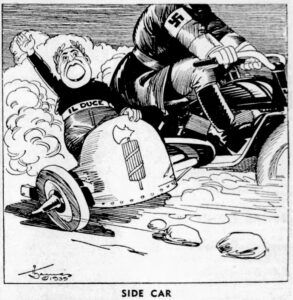
Cardinal Duhig glowingly described him as ‘like Napoleon with few, if any, of his faults’. Mussolini who we know was butchering so many people. How could Catholic spokesmen parrot such alibis and keep saluting him posthumously.
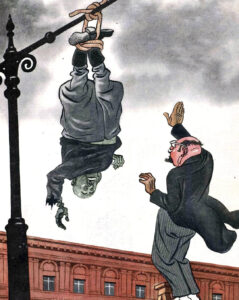
Some might say these statements, sowing doubts and confusion, bordered on apostasy and disloyalty’, I commented. How do we explain this blot on their conduct?’, I asked.
‘Allan, Despite their unfortunate choice of words none of them seriously went along with fascism.’
‘No, of course not. None of them ever did,’ I said, only too aware of Pope Pius’ notorious failure to condemn the Nazi regime and the deals he made with fascists. ‘I don’t know how those rumours ever got started.’
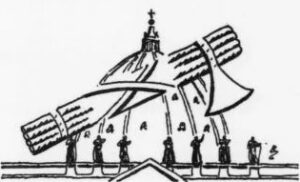
‘The thing is they were scatty and simply got carried away. To understand the position they got into, you have to understand their background. They inherited a deep mistrust of the British Empire and felt impelled to speak up for the Italian flock in the fight against Communism. This fight hasn’t stopped. The Communists haven’t made it easy. To be a priest serving in Eastern Europe today’, he said, reaching to the hamper for a sandwich, “is no picnic. Heavens preserve us, the Communists have committed a multitude of sins in these captive nations. . If there were seven deadly sins, they would find an eighth. They accuse the Church of offering people a false illusion. They mock our beatific vision of being united with our heavenly Father in a state of supreme bliss. Like the serpent that tempted Eve in paradise, they offer pie in the sky,

instead-,’
‘Apple pie,’ I said, cutting in on him.
‘– with the bogus promise of limitless output and leisure time.’
‘A workers’ paradise I hear.’
‘A fool’s paradise. Like Judas of old, they lie and finagle.
They say they’ll fulfil our deepest longings here on earth.
They put their faith in this wonderful day of days when they say proletarians will achieve victory everywhere.’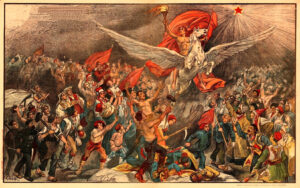
‘So it’s their vision of heaven on earth. Their millenarian vision of becoming members of redeemed humanity through the communion of workers and farmers.’
‘But it spells hell for us. They’ve disbanded and razed churches. Our priests act in the spirit of Thomas More, resisting Henry VIII’s seizure of church power.’
‘Martyred,’ I said, drawing my hand across my throat.
‘The Communists deny congregations the right to practice their religion. They have silenced the clergy. People have forgotten how to pray’.
‘What about the Pope? I asked, picking up a pie from the ground. ‘Can’t he do anything about this?’
‘Pope John is taking a very diplomatic approach to this matter. I’m told Pravda, the Soviet newspaper, has cautiously praised him. They see virtue in his upbringing as a peasant, like Khruschev, their leader.’
‘So what are the biggest hurdles along the way?’
‘The Holy Father is concerned about the lack of human rights in the USSR. He says people there must be able to practise their faith. He wants Khruschev to act like a defender of rights.’
‘What is Khruschev’s response?’
‘He points out that the West is hypocritical. He says it defends the rights of some who supress the rights of others.’
‘ With regard to Communist supression, does the Pope have the rights of any particular person in mind?’
‘The immediate stumbling block remains the situation of the Hungarian Cardinal Mindszenty. As you know he has taken refuge at the American Embassy for standing up for his beliefs. When Bobby Kennedy spoke up for him in Budapest they put him under close arrest for being a spy, accusing him of collaboration with Cardinal Spellman. They won’t forgive the Cardinal for standing up for victims of the Communists in Vietnam.
‘What happened there?’ I asked.
‘They beat a priest into submission with a bamboo club. They had nails driven into the skull of another in a mockery of the crown of thorns of Jesus. Another priest had been hung by his feet and beaten for defying a Viet Minh order to stop saying Mass at night. They’ve disembowelled women. They jam chopsticks in the ears of children to keep them from hearing the word of God.’
‘Holy Dooley’, I said. ‘What cruelty.’
‘Holy Dooley’ is right. When they were forcing all the Catholics out of the country, Dr. Tom Dooley helped them flee their clutches. He was backed up by Cardinal Spellman.’
‘His Eminence’’ I thought, tucking into a meat one, ‘seems to have a finger in quite a few pies.’
Monsignor Leahy reinforced the same message being piped into our house each work via the radio program of Bishop Fulton Sheen,. arguably the most popular public figure of the Catholic Church. With its conversational style his voice was known to many thousands of listeners as the host of The Catholic Hour, He pounded the episcopal message home in broadcast speeches and sermons Sheen believed people had to choose between two pursuits-the Cross or the Double Cross. The brash evangelist told us that a nominal Christian with a memory of the Cross can easily be twisted to the purposes of evil by men, particularly Communists, who masquerade as saviours.
‘The Communists have no feelings for other people.’ Monsignor Leahy went on, ‘They don’t listen to others. They listen in. They don’t watch over people. They watch their every step. They debase the individual. They don’t allow you to read and see what you fancy. They allow no search for God’s honest truth. Children are taken early and moulded to fit the vast machine that powers the state. They have no respect for private property. They take over people’s businesses and homes. They infiltrate workers organisations.’
‘Can’t members of the religious orders join them too and show their support for workers’ rights? Couldn’t working priests lead to a missionary awakening of the Church among working people?’
‘We have to be very careful there. That could be simply a new way for the Communists to reach Christians where they were to be found. By coming into contact with Communists, our clergy can become exposed to the same pernicious ideas.’
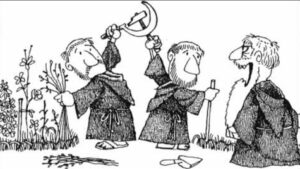
‘You don’t think the Communists can treat others justly?’
‘They don’t know the meaning of fair play. All these heathens know is how to inflict pain on people’.
Tender Mercies.
‘Stand up straight and hold your hand out!’ Something told me I wasn’t about to be presented with a sweet. I gritted my teeth, waiting for the first sharp blaze of pain across my hand. Each stroke she really laid it on. The whistling sound of the cane cutting downward through the air apprised me that all I could expect was a weal, a ridge the stroke would raise on my flesh.
‘Silence!’ Sister Casimir had howled out to the assembly like a mighty Wurlitzer. She was breathing fire. When she heard what she deemed an infringement of this command, she would point to whoever she thought had breached this commandment.
‘What did you say?’ she demanded of of one of my classmates who had whispered to me his discomfort.’
‘Oh, I was just thinking out loud’, he came back.
‘Well don’t’, she warned. ‘People get in trouble for that.’
Double, double, toil and trouble. I got the lot at one assembly when she put the finger on me. I was to be the whipping boy.
‘Good grief’, I thought, wincing, as she flexed it. ‘I’m for it. ’
‘If I’ve told you once I’ve told you a thousand times, you’re not to talk on assembly. You’ll write this out one hundred times.’
What rankled with us was that this termigant could pick you out at the drop of a veil for the most trivial infractions. I can still remember the instructions – ‘hand out level, keep your thumb down and out of the way, and don’t pull away.’ Lashing herself into an almost orgiastic fury, flushed more purple than ever, she smote thee thrice on each hand, prescribed I dared to say, by summoning up the Holy Trinity in her ghostly ritual. Take that! And that! And that!”
It wasn’t too bad if you copped it against the centre of the palm. Further out on the fingers, it hurt like blazes. It was no use pulling your hand away. If you did you got it even harder. She could raise welts like nobody else.
‘You’ll thank me one day for this’, said this flailing flagellator. ‘It’s for your own good.’
Why not? Of course she was only rough on us ‘cos she loved us.
‘Yeah, and pigs might fly” I replied, under my breath.
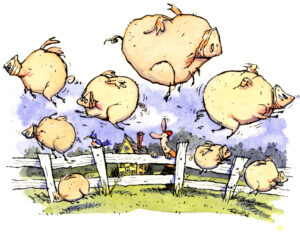
‘ Say what ?’ she demanded.
‘Yeah and time flies’, I replied without blinking an eye, somehow convincing her that I wasn’t referring to her, thus saving my own back. ‘Watch your tongue, boy’, she snapped. ‘Off you go!’.
Stinging from her scolding, I held my tongue as it occurred to me how I could express my gratitude to her.
‘I will thank you to keep your comments and your hands to yourself, Sister Harridan’, I said to myself. She was, unless I was very much mistaken, descended from the Marquis De Sade. Biting my lip, fighting back any tears welling, I headed for the tap to douse my hands in water to salve the pain.
Later in the secondary school, we were expected to use our ‘best writing’. This was always a trial as you had to frequently replenish your pen, dipping it in the inkwell on the flip top desk, and try to write without producing blots. The nibs would cross or break, or simply pick up too much or too little ink, with an inevitable result of ink on our fingers and clothes. All kinds of things ended up in the inkwell including the tips of braids.
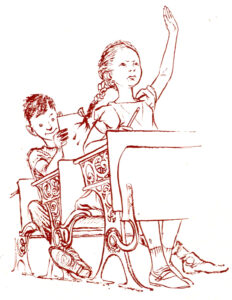
Sister Kieran, our class teacher would rap the back of our hands with the edge of a ruler and say “start again” if our work was not up to standard. The inkwell and blotting paper naturally had an alternative use other than holding and absorbing ink. Once she noticed blue pellets on the floor. All hot and bothered she raced around like a bullant when a stick is plunged into it.
After she slowed down, she asked, ‘Perhaps one of you would care to explain this to me? Come forward now.’
Everyone took a bopeep at one another shrugging only to give the expected comeback: “Nobody Sister, cross my heart and hope to die”.
“Own up or you’re all in for it. You’ll all all stay in”.
‘I’m Spartacus’, called one boy. ’No, I’m Spartacus’, called another and so it went on.
When she selected one as the guilty party , she declared victoriously, ‘It looks as though we’ve got a winner.’ She then demanded of her victim, ‘You’ve got a real nerve, boy. What have you got to say for yourself?’
‘I’m not telling on anyone.’
Upon getting the wrong reply, Quick Draw McGraw ticked him off, raising the cane backwards to whack him: ‘ This is going to hurt you a lot more than it hurts me. Let’s get this over with.’
‘Well I never. Swish. She got it over all right. Before she bore down on her intended target, she swiped me a real stinger on the backstroke. Right across the cranium.
She was totally unaware of any collateral damage. ‘I’ll thank you not to dip your nib in the well when there’s no ink, Sister,’ I cried.
‘You can take it can’t you, Allan.’
Seeing I was in on the deal, I took this as a backhanded compliment.
You needed gumption just to be in her firing range.
Many years later I would be in stitches watching Jake and Elwood, the Blues Brothers, being woman handled by Sister Mary Stigmata. I would thank her prototype, Sister Casimir for this motherlode that the Church has blessed the literary world with and for letting me off lightly.
Many others who had attended Catholic schools had had the living Christ beaten out of them. And that’s the gospel truth.
The Devil’s Showground
The ascetic lessons of sacrifice, confession and spiritual reflection would become a strong and lasting counterpoint to any more frivolous side of my sunny personality. Minding my p’s and q’s, I was always a conscientious student and never cheated. Well, just once. During a religious knowledge test, I looked into the soul of the boy next to me.
I didn’t get up to mischief. I was so naive as a kid I used to sneak behind the toilets and do nothing. This was no vouchsafe against getting the ‘cuts’ from some of those big on wielding the cane. On one occasion Sister Stephen, the principal, whacked me for jumping up to look over a fence while marching in line to benediction.
Another occasion to interrupt lessons took place soon after the travelling showground families had rolled into town with their overflowing trucks and caravans for the annual agricultural show, set up their rides, stalls, sideshows and spruiked their offerings to the locals.
‘Come on licorice!’ called the barker out on the front platform, on top of the tent. He was drumming up both an audience and anyone wanting to have a go. Country boys liked a bit of a punch-up according to the owners of the business. As for the Aborigines, they believed: ‘It’s in their blood to fight.’
A visit to the boxing tent was as much a part of the show as Dagwood Dogs, amusement rides and district exhibits.
People would pay for the privilege of going a few sometimes bloody rounds with the troupe of boxers, more often than not aboriginal, eyes turning blacker than their skin.. Some shows included professional wrestlers.
People lined up to see the fat tattooed lady – now they’re everywhere.
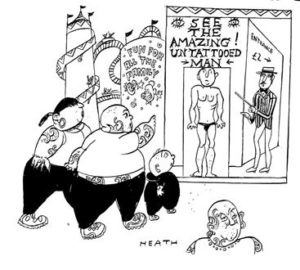
A spruiker drew in the crowd to see the contortionist:
‘Hurry, hurry, roll up, roll up, see our top billing
the greatest show in town for only one shilling.
Step right up, hurry, hurry before the show begins, my friends
Stand in line, get your tickets,
I hope you will attend, to excite you backwards our human knot will bend,
See our Filipino fold his body forward
See him fold his body backward.
The Manila Folder is sure no coward.
No doubt about it, satisfaction’s guaranteed
So let the show begin
Make it snappy, step right on in
Can’t afford to pass it by
Guaranteed to make you wonder why,
It’s more exciting than a one man band
The best little show in all the land.’
What concerned the principal on this occasion was not so much what was going on but what was coming off.
This time her delivery was for me attending a sinful ‘striptease’ sideshow performance. What had been little more than a sideshow became seen as a den of iniquity. Such forms of entertainment were frowned on severely, seen as designed to make people happy without divine assistance. Muggins me was guileless enough to put my hand up when quizzed at assembly. I had actually only gone on sufferance, being a bit of a Holy Joe myself.
I was so polite when I saw women wearing a bikini, I only looked at the covered parts. Being a male it’s what you don’t see that you’re interested in.
However some madcap girls insisted I go.
Keeping my eyes closed most of the performance, I dared not open them. Finally, I forced them open them furtively at one stage to glimpse the vague outline of a human form behind a thick sheet of glass fairly impenetrable to sight. Neither bump nor grind. Merely hokum.
A friend asked, seeing me emerge from the tent ‘Did you seen that show?’
‘On and off,’ I said.
‘And how did you like it?’
‘Off.’
At school I was told I had transgressed the Seventh Deadly Sin. ‘ We’re such weak pitiful creatures, prey to the vilest temptations of the flesh. Remember yourself. Your body is a temple of the Holy Ghost. Those who abuse it by posing naked or leering at that pose are trafficking with the devil himself. He tempts us and tells us to sin which we must resist.
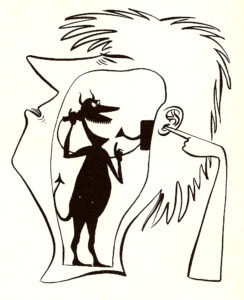
If you don’t watch out, you’ll form habits that will be hard to break later. None of our activities in this life go unrecorded. If you harbour impure thoughts, indulge in base vices, God will turn away from you. Remember he died for your sins. ’
There I was just turned twelve, a crime committed thousands of years earlier hung on me .
The ensuing penance imposed on me, ‘equal to the gravity of the sin’, led to greater transparency in this matter. To the striking disclosure how religious authority can resort to violence to prevent a child learning about the human body. To realization of the restrictive boundaries of the Church when dealing with sexuality. A topic never mentioned except in vague general admonition about ‘purity’ and ‘clean living.’ This was still a time when sex was something few talked about openly and sexual development was accompanied by ignorance, fear and psychic trauma. The nun’s action, with much left to the imagination, said more about what was in her prurient mind than was in mine.
On another occasion this moral watchdog cracked down on students after the school dance. It wasn’t about clinches too close for chastity. Something far more serious. Somehow the Hokey Pokey had made it onto the program.
One of the Sisters had had a go at it on a pervious occasion but thanks to the Grace of God turned herself around.
It was something quite innocent and fun filled as far as I was concerned. Oh me, oh my. The idea of body parts other than those in the lyrics being put in and out of the ring and wiggled and shaken hadn’t occurred to me. Any sexual overtones of this dance were put in my mind by this nun who laid the seeds of my secular awakening. On that account it only made me think more about it. Ironically one plausible explanation for the origins of this dance’s name lies in the corruption of a phrase used in the ritual of the mass.
After the hemlines of the girls’ dresses had been checked for proximity to the floor, close contacts between girls and boys were conducted under conditions of strict vigilance. At one school dance, I said to my partner, ‘Do you have the feeling there’s someone coming between us.’ One of the older nuns went round couples, her arms outstretched to indicate the regulation distance for being close, ‘Don’t forget to make room for the Holy Ghost,’ she reminded us.
She prowled around our classroom, creeping up behind us at our desks to make sure our book was open at the right page.
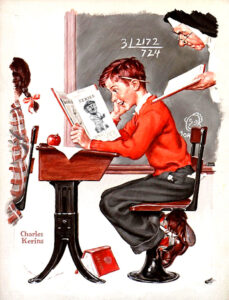
The infliction of pain on me at St Mary’s did not stop with some nuns. I collected a ‘rabbit chop’ to the neck from one boy and a cricket bat hurled at me by another who went on to graduate as a policeman. I’m not so precious to consider that this was big time bullying, but considering that this was a fee paying institution my father concluded you could avoid this arrant tommyrot without the cost.
Catholic boys in the final years of secondary school in a country town like Gunnedah were usually shipped off to a larger centre or the city. At a time when as in many facets of life the separation of Catholics in education was waning, my father ruled this out. “Better to put the money saved towards a university education”, he opined wisely. “Look at John Kennedy”, he said “He only spent one year at a Catholic school but that didn’t stop him being publicly identified as a practising congregate”.
My father’s Catholicism was much more secular than my mother’s. He had tasted the harsh regime of Christian Brothers as a boy: ‘I received more than my share of corporal punishment for relatively harmless offences.

Some of the Brothers were real sadists’, he recalled’, raving about the ‘filthy beast’ called lust while they flailed us with their sticks. We spent so much time escaping their violent attentions’.
Wisely he saw fit to send me to the state high school. I was more interested in understanding the headless pins that made up my my record player’s styli than those with heads and angels dancing on them.
Finding it increasingly difficult to reconcile the preaching and practice of Christ with those of most of his professional servants, I would increasingly shed any vestigial belief in the supernatural, messiahs and men in the sky authoring public morality. The whole Judeo-Christian view is that the body belongs to a fallen world and nature belongs to a fallen world, and I don’t accept any of that at all. Both a sensualist and an ascetic, I think the sacred is in this world, not in another world, and in the body and in nature.
I continued to love the peaceful precepts and example attributed to Christ. I saw him as no kind of miracle man, no surveillance agent of the highest level, no super being who concerns himself with our fates and actions, but a whole and magical human being with no magic advantages over the rest of us. Who could lift people up but not with the aid of mirrors or crippled midgets behind black curtains. I aimed to become as human all over as I could and to bear the responsibility for my own actions.A man of character and virtue.
A Delicate Matter
But not before my next brush with another major figure from the Establishment which occurred in 1961. It was quite instructive. The year my voice broke Menzies had appointed a new Governor-General who had the impeccable pedigree and accoutrements of the nobility that he himself, a mere bunyip aristocrat, still lacked. Nay the ceremonial head of state also had a distinguished military record. While travelling widely throughout Australia and stopping off in Gunnedah, his duties were to cut ribbons, unveil statues and monuments, utter generalities, attend garden parties, celebrate outstanding anniversaries. open formal events and buildings. He didn’t have much in particular to do but he did it very well. It was said that he would be on hand to attend the opening of an envelope. Another duty was to encourage by his presence and interest, individuals and groups considered to be making a substantial contribution to the community and to national life. That’s where I came in.
As a member of the student body, I found myself part of the guard of honour formed to welcome the vice regal visitor. Once settled on the podium, the Governor-General took the floor, launching into an upbeat appraisal of the state of affairs in the British Commonwealth. His address started something like the following: “Ladies and Gentlemen, Sisters of Mercy, Boys and Girls, On behalf of her gracious Majesty the Queen, I must say how proud we are of our Commonwealth of Nations and the family of nations that belong to it. Former members of the most benevolent empire the world has ever known. Ruled not by superior force or skill, but by sheer presence. It only ever went to war to defend values and principles, never to acquire territory or to subjugate people.
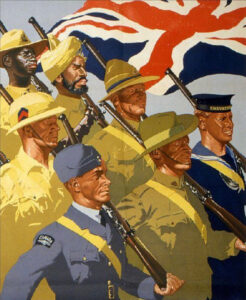
Its people such as the Indians and Africans sacrificed their lives fighting the Japanese to keep Australia safe.
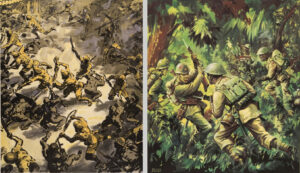
In return the empire left behind for the local people roads, hospitals and schools. We ought to always remember that. The ties of loyalty that bind us together bring us a collective voice, greater prosperity, shared values and principles like democracy. It brings us cultural and educational exchange. It is my great pleasure to tell you that this family will be growing over the coming years. Most of the remaining Crown territories will become independent. They will choose to maintain their links with the other countries of the former empire which had jurisdiction over one fifth of the human race.
I call on you, especially you youthful Australians to nurture this family of nations on which the sun as before never sets on at once.’
‘Maybe God didn’t trust it in the dark,’ I thought.
‘I call on you to learn from its peoples. I call on you to its service. It is within the province of all of us to be great or small, according to the degree of service we render, service of one man to another, to a community, to a nation, to all mankind. Anything is possible.’
‘If this is so,’ I wondered, ‘is it possible for something to be impossible.’
‘It is by service we are born, we live, and we are carried to our last resting place. It is therefore not just an obligation, it is the very purpose of life – to serve.’
I was fain to follow out the benign spirit of his exhortation. Happenstance came forthwith. Making his way along the guard of honour at the end of his address he paused his review, according to his wont, to inquire of children after their interests.
“Young man ”, he asked me “What subjects do you like to study?”
“ Verily I say unto you, Your Excellency, history and languages,” I replied. ’I’m studying French and Latin”.
“Magnifique!” he enthused. “My life is closely bound up with France and its language. My family came over with William The Conqueror. My title originates from French. Viscount comes from two parts ‘Vis’ means ‘in place of’, like ‘vice’ in vice-royal. ‘Conte’ means ‘count’. “And my titular name is ‘de L’Isle”, he said.
This aristocrat was known for his pride of penmanship.
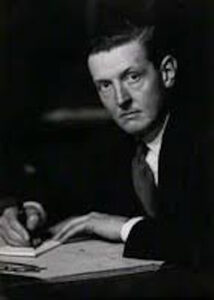
He then tore out a page from a pad at hand, wrote it down and handed it to me.
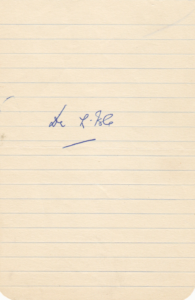
‘This means ‘from the island’ in French, or from ‘insula’ in Latin. It originally stood for coming “from Lille’ in France which used to be an island of dry land in a marsh”.
‘Your Excellence,’ I said to him, we have something in common. Let me write my family name down for you,’ I said pointing to the pad. I wrote down the word ‘D’avis’. This originates from the French word meaning ‘of the opinion.’ When my family came to Australia they dropped the apostrophe. They thought people might think they were bunging it on.’
‘Master Davis,’ he said, I’m of the opinion you’re teasing me. But I’m delighted to see you’re playing with the French tongue. Let me just let you in on an interesting term in French. This officer assisting me, my aide-de camp gets his title from one who aids or helps in the military camp.’
Unlike Menzies who saw himself as British to the bootstraps, it seemed de L’Isle was British to the ‘languettes’. It entered my mind that the stronger your connections with the French, or in the case of the royals with the Germans, the more British you were. That is if you’ve blue blood.
I had a question ready for the Governor-General arising out of my reading about his background. In framing it, the advice dispensed by Sybil Thorndike’s Dowager Princess to Marilyn Monroe’s showgirl about how to address the royals was fresh in my mind. This was no less than to say what is obvious.
‘ Hail, Milord, well met, I believe you were injured during the War. Where were you shot, pray tell me?’ I asked, shucking and jiving, somewhat presumptuously letting slip what I felt was the kind of archaic highfaluting utterances you might hear at court.
“In Italy” he replied.
“Italy?” I queried “but where forsooth …” Before I could finish the sentence he was off again, spreading his stately personage hither and thither in the short amount of time he had. But not before I caught the faintest trace of a blush betraying blood the same hue as my own coursing through his veins. Was he being coy about something? It was the aide-de camp shadowing him that my complete question would fall. As he passed, I put it to him. “Sir, I wanted to know what part of His Excellence doth sustain the injury?’ Smiling at me vacantly he lowered his head and whispered in my ear “Hearken to this. Dost thine homework , Danny Boy!”
Avast! Was this an officer but not a gentleman taking the micky out of me, this green Catholic bucko? Did he think this was bush week? Did he think I had been out of place the way I had spoken? Chewing over this puzzle during the following days, I couldn’t make head or tail of it.
Gadzooks. It turned out to be a tail. The breakthrough came after I conveyed the aide-de camp’s advice to Sister Aloysius, my dear music teacher.
‘Danny Boy’, she informed me, ‘is the familiar title of the Irish classic ‘Londonderry Air”.’ After much deliberation I rearranged it in franglais as ‘London Derriere’. Further research turned up the fact that the Germans had lodged a bullet in the nobleman’s buttocks. Methinks I had been given a bum steer – albeit one in the right direction.
The Secular Estate.
At first blush I was a bit apprehensive over the new academic direction I was headed At that time there was still some residual degree of division between Protestants and Catholics. Some newspaper job advertisements, as late as the 1960s, even confronted Catholics that they needn’t apply.
Many Catholics in turn had their prejudices about Protestants. One local girl who went to work in the Big Smoke arrived back home and her dear old mother was just overcome to see her again. ‘Oh darling its just wonderful to see you again looking so nice. And sending me all this money all this time. Tell me, dear what have you been doing to earn all this money?’
“Well mother, I don’t know how to tell you this, but I became a prostitute!’
Mother went white, clutched at her breast, and collapsed in a heap on the floor. Her daughter brought her a glass of water and she staggered back on her feet.
She faced her daughter. ‘Tell me again darling I want to hear you say it again, so I can‘t be sure I heard you right.”
The girl says: ‘Yes mother, I said that I became a prostitute!’
The old girl heaved a huge sigh of relief, wiped the sweat from her brow and said: Oh Jesus – thank the Lord for that. I thought for a minute there I heard you say you’d become a Protestant.’
My father’s parents had come from both sides of the aisle. My grandfather was Catholic, this side seen as that of the Irish without a penny to their name. His own father’s family had been forced to light out during the great wave of immigrants in mid-nineteenth century.
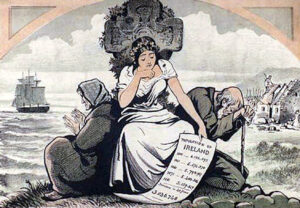
In famine stricken Ireland many had perished.
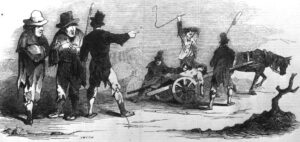
Much of the peasant population lost their staple food, as cash crops were reserved for export to Great Britain.
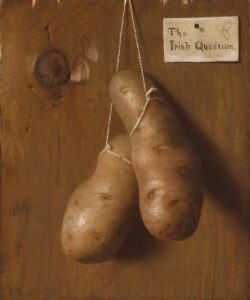
My grandfather told me ‘The English summed up what they thought of them in one sentence: “Those bogtrotters keep pigs in the parlour”.
‘Pigs arse!’, he exclaimed. ‘They were talking through their bowler hats. It was those who didn’t have a pot to piss in or a window to throw it out of who mainly kept pigs. And in their houses there were no parlours’.
My grandmother’s was on the Anglican side, it seen mainly as the spiritual home of the rich and fashionable. Except, in her case the second of the Catholic Church’s choices for women- perpetual virginity or perpetual pregnancy- won out. As she and her husband’s brood was larger and closer and more within cooee than my mother’s, it was their union that shaped most the ideological and cultural makeup of my parental family.
In this mixed marriage the issues determined to a large extent where your business went, to whom you paid your tithes, and where you fitted in with respect to the establishment. Religion-wise my father and his six siblings were a mixed bag, half choosing to stay aligned on the spear side, half staying on the distaff side. Seeing my father went along with his father, Paddy, and married a Catholic, the sense of the Irish Catholic thread, and of coming from an often oppressed minority – albeit a most significant one – carried through generationally.
Dad took me to see ‘Shake Hands with the Devil’ in which Lady Fitzhugh an Irish noble woman, is arrested and put on trial for assisting the IRA. Sybil Thorndike’s Lady Fitzhugh challenges the legitimacy of the officer trying her: ‘What’s an English judge doing in an Irish court.’ Dad supplied his own answer loudly: ‘Up to no good.’
‘As far as I can see, Dad, all the differences between the various religions and their followers can be linked to whom they recognise as legitimate.’
‘Allan, it’s all about recognition. Jews don’t recognize Jesus as the Son of God. Protestants don’t recognize the Pope as the Vicar of Christ and Baptists don’t recognize each other in the pub on Saturday nights.’
It occurred to me it would be probably more sensible if people brought up their children free from all these traditional divisions.
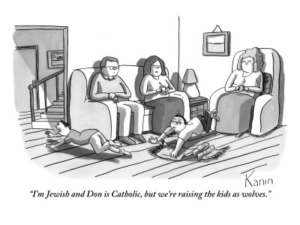
At any rate the times in christendom were a changing. My aunt Colleen pointed out to me in 1960 the ecumenical milestone reached by Geoffrey Fisher, Cantuar of the Church of England : ‘The courtesy call by Pope John XXIII on the Archbishop of Canterbury, is the first meeting between a Pope and an incumbent of this office since the English Reformation. This paves the way for greater tolerance. I agree with what he says about the words Catholic and Protestant. As ordinarily used they are completely out of date. They are almost always used now purely for mischievous purposes. To make waves.’
‘So what are the real differences?’ I asked.
‘As Anglicans we have no faith of our own.’ replied my aunt. We sit in the ‘middle way’ between Catholicism and outright Protestantism.
Our statements of doctrine and liturgies contain, and have always deliberately contained, elements of both. Anglicanism has no Scriptures of its own, no sacraments of its own, no holy orders of its own – just those of the one Holy, Catholic, Apostolic Church that we have received.’
‘The same rituals, half the guilt,’ I said.
‘These creeds we hold without addition or diminution. Geoffrey Fisher says we stand firm on that rock.”
‘What about all the issues that led to the great schism? What about the 39 Articles adopted by the English Church after its break from Rome in the 16th century?’
‘These must be put to the side. Our high priests don’t have much choice than for our churches to come closer together. We can’t go back but we must move forward together. They’re looking for a common front in the face of what they see as increasing materialism. The Archbishop thinks that of the Soviets cruder than the more refined Western variety. And more likely to triumph.’
Both the head of state of Vatican City and the primate and metropolitan of all England were presiding over their respective communions during a momentous transition in modern culture and society: from deference, dependence, and duty to indifference, insecurity, and mass individualism. As the Empire was ending, the masses at home enjoyed the welfare state. Revolutions in higher education, health, and consumer spending gradually gathered pace. The end of conscription, emerging feminism, and comparative affluence further eroded the old order. The Anglican Church and all Western Christian churches faced a new intractable problem- wealthier leisured classes rather than poverty.
This was a shock for many but it softened any discomfort for me settling into my new high school. The first day, I felt as out of place as remove-like a pig in Tehran. However while most students were nominally Protestants, the secular nature of the system soon proved congenial and, having a natural affinity for hitting the books, I settled down to two years of preparation for the university entrance examination. I absorbed the required knowledge like a blotter.
A tisket a tasket, something was missing from my matriculation basket. Physics and chemistry, the scientific end, which hadn’t been available at the parochial school when I was there- another factor influencing my father’s decision. It was too late to pick them up when I got to the local high school although I did study biology which I lapped up. My remaining subjects were deemed to have sufficient cognitive demand to provide what I needed. A suitable preparation for future university studies in economics and the humanities, ones which could normally be studied further once I got there. All going well I would be the first member of my father’s clan to make it there. Having invested so much vicariously in my career path, I would be embodying his own cherished aspiration.
‘I never got the chance to go to university, Al. It wasn’t in the cards. But if I had, I would have wanted to take all my tests at a grocery store.’
‘Why’s that Dad?’’
‘ Because the customer is always right.’
Stage-struck.
“If all the world is a stage, where is the audience sitting?”
George Carlin
It was during this time that I would be introduced to the works of the Bard of Stratford on Avon, the high priest of literature with his expressiveness, athleticism and fabulous felicity of language. Qualities every writer would strive for.
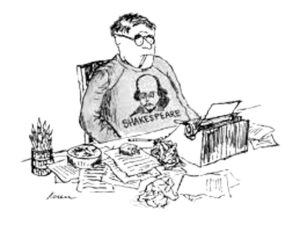
The remarkable thing I found about Shakespeare is that he really is very good, in spite of all the people who say he is very good. Plenty of it went right over my head, wouldn’t you know it, but that’s part of what made it attractive and valuable. Things that go over your head can make you raise your head a touch higher.
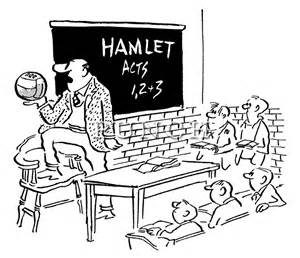
Where others were turned off, I worked my own sweet way through the arcaneness, interpreting the words we don’t recognize anymore. Once I broke through the language barrier, the experiences and emotions Shakespeare wrote about spoke to me. Their timelessness, their distilled representation of life lodged deep in my skull and never left me. With him, there’s always talk of the cosmic nature of things – the sun, the moon the stars.
Despite his having lived in a different society, in a different time, the same emotional dynamic infused and animated society as it was doing around me. I could see the hunger for love and what it does to people in his plays alive and well around me. They have everything young students can relate to: blood and guts, hatred and destruction, the lust for power, and the ability to reflect today’s gruesome political reality.
Each of his plays showed in terms of thinking about what it is to be human, what it is to live in society, and above all, what it’s like to live in personal relationships, men and women together, families not so different to mine and his.
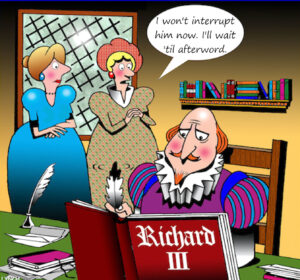
Shakespeare really worked these out in a profound way. What I learnt from him is that theatre is a sacred art and not some fringe pursuit.
The most important thing he taught me is that we’re not alone. There are some experiences that are so subjective that you might believe you are the only mad person in the world that has actually felt that way or thought that way. Shakespeare’s ability to articulate those ideas into something an entire audience can feel, too, is what theatre is all about.
‘Shakespeare’s crafted his language for the stage,’ said our English teacher Ron Davis. ‘He wrote to put money in his pocket, food on the table and fire in the bellies of his audiences, not strike teenagers like you with fear. He didn’t intend his works to be bound to a desk with teachers like me taking students like you through every word in his sentences. Most of Shakespeare’s audiences were illiterate. Like you who are less so they didn’t know the meaning of every word uttered but the sounds and pictures they created kept viewers enthralled for hours. His words were chosen to be spoken or heard, not to be read and deadened behind a desk – they wither when performance is removed. It’s our job to analyse his language, but pick apart every word of Shakespeare and you’ve dissected the butterfly – pretty in parts but a nonsensical whole and sure as fate unable to fly. His plays are meant to be explored on their feet. No one has all the answers and everyone has different opinions: why does Juliet say this? Why would Macbeth do that? Actors and audiences have to argue over his plays’ meaning. They have to find multiple ways of delivering their word and deed.
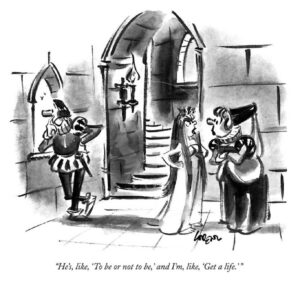 ‘
‘
‘Ladies and gentlemen,’ Ron Davis said to us, ‘characters are essential to a good story, and it is the main characters that have the greatest effect on the plot or are the most affected by the events of the story. Before we look at a very famous story I’m going to test you on your knowledge of one main character . I’ll give you the clues about who it is. IThe story involves a young woman who tries to escape her problems of confinement for freedom of action. When she and a young man first lay eyes on each other, they fall in love. However she faces living without him because of restrictions placed on her movement. They want to escape together and formulate a plan to that end. This all makes the plot more suspenseful and tense. Now can anyone name this character?’
I know Sir,’ said a classmate, waving his hand enthusiastically. ‘It’s Rapunzel.
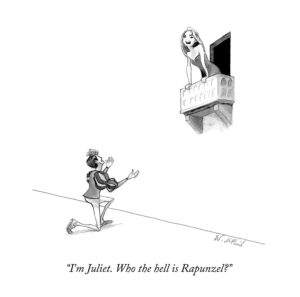
When introduced to Shakespeare’s famous story, the same boy queried the genre in which it belonged.
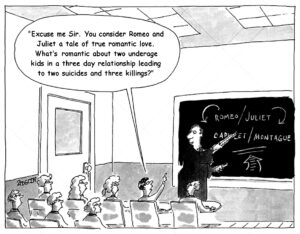
A Most Excellent and Lamentable Tragedy.
‘Have you worked out who and why your favourite Shakespearean characters are? Mr. Davis asked me.
I’d have to say Romeo and Juliet. Their names are synonymous with that of young star-crossed sweethearts. Because of Shakespeare’s artistry in endowing these characters with innocence, naïveté, and spirit, they are my favourites of his. The love they share is no sentimental, conventional affair.
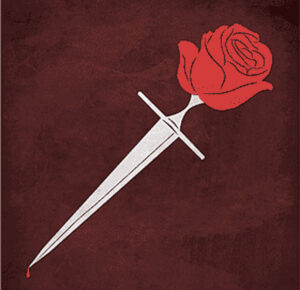
That which that springs up between Romeo and Juliet is a brutal, ecstatic, overpowering force that supersedes all other values, loyalties, and feelings
‘So for them love conquers all, would you say.’
‘The couple convey the intense emotions, the grand magic and ardent yearning that can accompany the discovery of first pure love. They also engender strong forbiddeness from adults more preoccupied with longstanding family feuds.
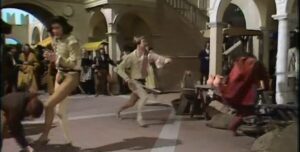
‘How does this fever of feelings start?’
‘After Romeo’s initial pining for unrequited love comes the rush of heightened mutual passion between him and Juliet.
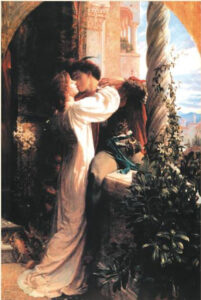
‘Can he sustain this?’
This gives him a purpose in life for the very first time.’
How does the iconic balcony scene solidify their bond of love ?’
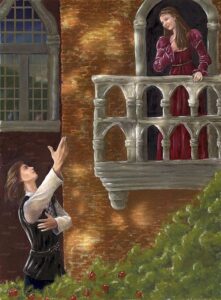
‘Romeo and Juliet are completely alone then for the first time and can express themselves freely. They decide to marry secretly.
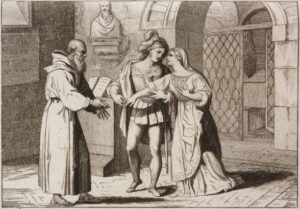
There is much tension and suspense here because of the danger that they may be discovered, That simply adds to the excitement.’
‘Can Romeo sustain his newfound love?’
‘Crushed by their families bitter hatred for one another, swept up by a tidal wave of giddy helplessness, the ll-fated pair show brave determination in remaining together at all costs. This involves the memorable device of Juliet, unbeknowns to Romeo, taking a drug she got her hands on.
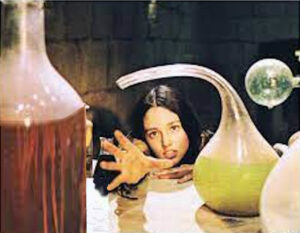
This put her into a deathlike coma.
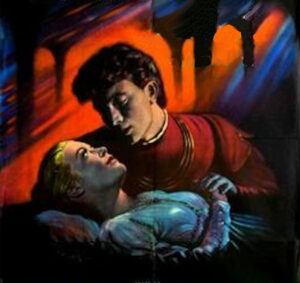
Believing Juliet to be dead, Romeo drinks the poison. Juliet then awakens and, discovers that Romeo is dead.
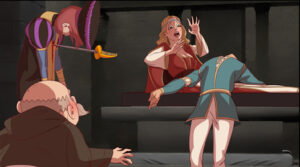
She stabs herself with his dagger and joins him in death.
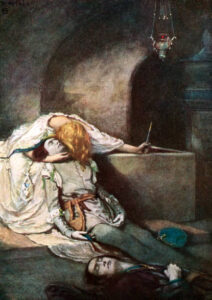
‘What effect did this have on you?’
This invited me to think about what it means to see and understand.
Their tragic choice of suicide is the highest, most potent expression of love that they can make. It is only through death that they can preserve their love, and this is so profound that they are willing to end their lives in its defence.
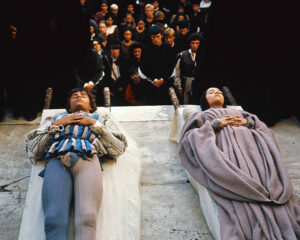
‘Does this drama connect you and others to the emotional area of life?’
‘The romanticism of the love-struck lovers’ final doomed actions is both desperate and destructive.’
‘It’s said that It taps into adolescent society’s deeply rooted rebelliousness .’
‘This attitude as well as the action is what draws me as a young person so closely to it. I sympathize and identify with Romeo and Juliet. Romeo and Juliet find at last an ideal they could die for.
‘The youth are always hungry for ideals.’
Studying the canonical text would enable me to breeze through Zeffirelli’s exciting version later that decade. The Italian’s approach would catch the spirit and life of Shakespeare and didn’t get bogged down prematurely in the language. Deeply moving, it has the passion, the sweat, the violence, the poetry, the love and the tragedy in the most immediate terms I can imagine.
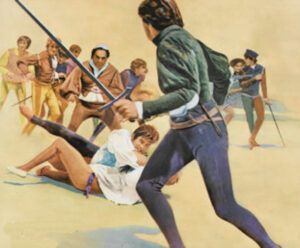
The actors were closer to the ages of Shakespeare’s characters.
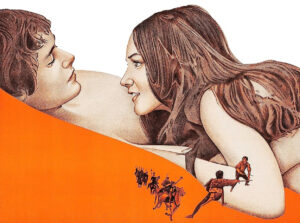
What would catch my attention at the outset would be a familiar voice delivering the play’s famous prologue -“Two households, both alike in dignity”. Romancing the spoken word, it was Laurence Olivier’s powerful, utterly distinctive, astonishingly versatile voice with its distinctive whiplash clarity yet again stopping me dead in my tracks.
He and John Gielgud, well-known stage Romeos had taken turns to play the part earlier in their careers.
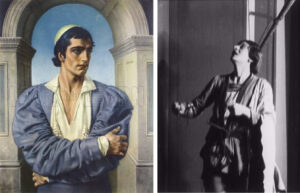
In the crowded street outside their theatre, it wasn’t hard for them to feel the emotions they were portraying.
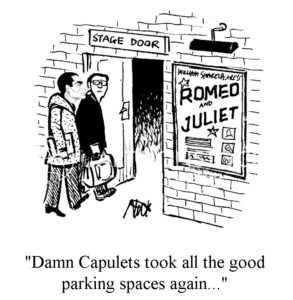
Now they had delivered the prologue unseen in different cinematic interpretations of the play. I had heard Gielgud recite his in the 1954 version also shot in Italy and would see him appear as well in the 1978 BBC production.
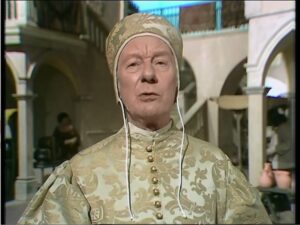 Mining through the Bard’s works, indulging my emotions, flexing my vocal muscles, delivering my lines, I developed a strong lifelong taste for theatre. Being shy, introspective, guarded in nature, without too much to say for myself, public speaking had left me a a quaking jelly of petrified self consciousness, my tongue sticking to the dry roof of my mouth, afraid of fluffing my lines.
Mining through the Bard’s works, indulging my emotions, flexing my vocal muscles, delivering my lines, I developed a strong lifelong taste for theatre. Being shy, introspective, guarded in nature, without too much to say for myself, public speaking had left me a a quaking jelly of petrified self consciousness, my tongue sticking to the dry roof of my mouth, afraid of fluffing my lines.
‘Don’t worry, Allan,’ Mr.Davis assured me, ‘It’ll be alright on the night.’
Dressed up in tights and garters, greasepaint and masks while moving around, acting enabled me to break the ice, open up and express myself more freely.
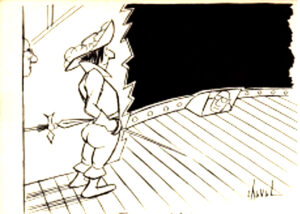
‘With talent comes doubt,’ Ron Davis assured me. ‘Fear of the unknown, Stage Fright. You’ll get over it.’
I didn’t know I had it in me. While we parsed ‘As You Like It” and ‘The Tempest’, better still we mounted performances of them as Shakespeare intended. I followed Laurence Olivier’s approach, the same taken by Wil himself. I aimed to find the external look, walk, speech of the character and then come on to his inner thoughts and feelings.
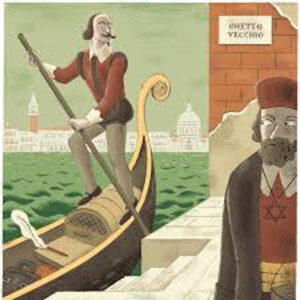
In ‘The Tempest’ I lent my lungs to the role of Gonzalo, the ‘honest old counsellor of Naples. Knowing he was good hearted, and wearing a grey streaked beard, I began my character development from there. From that everything flowed. The moment I was dressed, the costume and the make-up made me feel the person he was. Walking slowly, calmly, stroking my beard, I thought of myself as none other than the wise and generous counsellor with an optimistic outlook on life. Staying positive, breaking up arguments, I was the only character able to see the mis-shapened Caliban as more than a demonic beast. The one who reminds my fellow shipwreck survivors else that they should be celebrating because they’re alive: “Beseech you, sir, be merry. You have cause, So have we all, of joy; for our escape is much beyond our loss” (2.1.1).
If our audience didn’t get some of the words, the puns or even some of the characters, if our lines were well delivered, using spontaneous, comprehensible, natural speech patterns, they got enough of them to enjoy the play. We avoided laying on Ye Olde Englande over coloured, overt musical, poeticised stuff.
The audience got some unplanned laughs one night. One of our falstaffian members broke through a termite weakened floorboard sending his foot into the crevice. Since he was unharmed we thought no more about it. It was just a stage he was going through.
After so many exits and entrances, I would put such board treading behind me, never to come to a theatre near you. I would further my understanding of Shakespeare through my reading and writing. I would keep not my costume, but my pencil sharp, to see the point. The main question that would remain for me: ‘What kind shall I use? 2B, or not 2B?”
However this drama tragic, away from the footlights’ glare, remained eager to witness the commanding presence that others could impose on such works, others who could convey the sheer poetry of his language, its sheer descriptive quality, those who had a sui generis perspective on the man known as the greatest writer and dramatist in the English language.
On a Good Wicket
Another facet of my schooldays was an activity somewhat akin to drama. Based on conflict, guile and deception it involved lengthy periods of inactivity while us players choreographed into position and posture, circled each other, watching and kept dangling. We made our entrances, we made our exits as honorable opponents; we were bound by a code of fair play. Seated waiting for my entrance I kept the benchmark in mind. The player who had held the stage unchallenged.
It’s Not Golf
The water tank at the back of our house sat on a wooden platform and was close to a shed. It needed to have a round brick base and be less confined for my purposes. I needed to be able to hit a golf ball against the base with a cricket bat and hit it back when it rebounded at any angles. This is how Don Bradman, the greatest cricketer and batsman of the 20th Century honed his remarkable powers of co-ordination, concentration, unnerving judgment, fast footwork and decisive powerful bat motion to a fine edge.
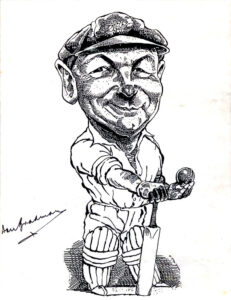 Hitting the golf ball in the garage where I threw bolt bombs would suffice. There, game faced I replicated the Dons technique for sharpening his reflexes and developing his strokes. The bombs had already taught me to be nimble. Unlike the Don who had to practice in the absence of friends, I had ample opportunity to train with my school mates.The families of some even trained indoors.
Hitting the golf ball in the garage where I threw bolt bombs would suffice. There, game faced I replicated the Dons technique for sharpening his reflexes and developing his strokes. The bombs had already taught me to be nimble. Unlike the Don who had to practice in the absence of friends, I had ample opportunity to train with my school mates.The families of some even trained indoors.
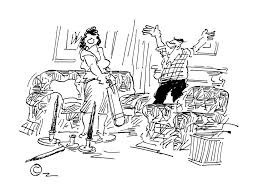
There was nothing like the smack of leather on a willowy blond to let us know that summer was coming.
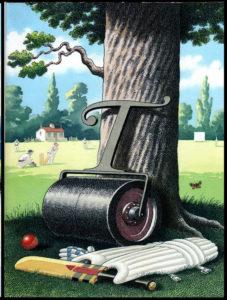
Not that I had an overriding sporting career ambition in mind.
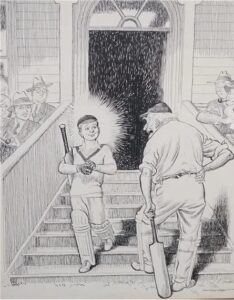
I simply went in for the fun and action of this gentlemanly game, playing third slip as a fielder.
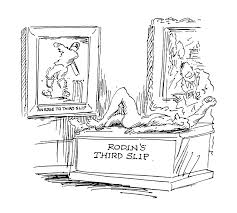
Nevertheless, I aimed to focus as did its near flawless exponent as I stepped up to the wicket – keeping calm and still while awaiting the bowler’s delivery, sizing up the ball in a flash and exploding into action, dispatching their fieldsmen to all parts of the park. Touching base with the Don, a humble man, I said to him ‘Good on you, Sir Don, you’re a real beauty.’ I told him that his admirable personal qualities were ones I wanted to emulate. Being part of a team yet standing out, knowing just what was needed to be done to achieve a grand slam. The Australian people, hit for six during the Great Depression and finding themselves on a sticky wicket, kept in fine feather when excitement over his tally of runs reached fever pitch. Hats went in the air as he hit balls round the boundary.
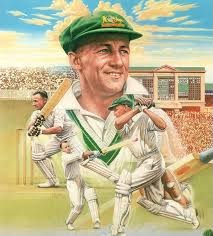
I told this national treasure his contribution transcended sport. He slogged his appreciation back to me forcefully and economically.
![]()
This Sporting Life.
Over these years, taking part in and following organized sport was naturally de rigueur.
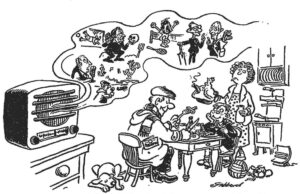
For a couple of hours a week, our little town, one community, lived and breathed as a single being. This was during the weekly game of rugby league, the town’s overriding religion. In a country where men were men and if boys knew what was good for them, they were men too. The game would always go on come rain, shine or stiff easterly breeze.
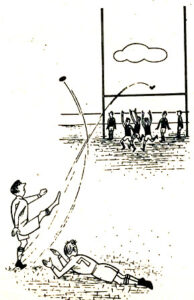
Weathering nicks, abrasion, bruises, collisions and concussion, with crowds roaring on the touchline, I engaged in this gladiatorial game at school. On the wing, I would wait cautiously, feet astride, crouching, my arms pushed out protectively, while some bruiser ran at me and shoved out his fist. Grievous bodily harm was an ongoing curse. Like death, tax evasion, and of course shipping and handling too, it was inevitable. Each week I would brace myself for another clash in which my gangly frame would get roughed up and flattened again and, black and blue, dinged and dented, I would ache like the devil. After which it was time to bounce back to the end of the line – on the wing.
We usually got thrashed by the bigger boys from Tamworth High, some of whom repeated their final year to stay on top.
They saw us as good sports. The only disadvantage to this was that we had to lose to prove it.
Going down to them in the comp yet again, we once did a lap of disgrace after full time.
And the Lord said unto John, “Come forth and you will receive eternal life”. We came fifth and won a wooden spoon.
We received an honourable mention in ‘The Namoi Valley Independent’.
We said at the outset of each season we’d be the team to beat that year. And sure enough everyone beat us..
When our headmaster asked a visitor if he would like to look at the trophies won by our team, he replied that he wasn’t interested in antiques.
The blame for our losses usually fell on our backfield player, the one positioned nearest our defensive goal line.
‘I think he’s one of the drawbacks,’ I overhead one of the girl spectators say.
This utility player, chosen when we were a man short, was more a futility player.
All and all the game was goodly for my sense of esteem, but a relief when the time came to hang up my boots. I had shifted my gaze, becoming a keen observer of another far more chilling blood sport.
The Band Begins to Play
Finding my musical feet, I stepped up to the bandstand – in Wolseley Park, and other venues – as a fully kitted member of the Gunnedah Municipal Band, a bastion of the town’s civic pride.
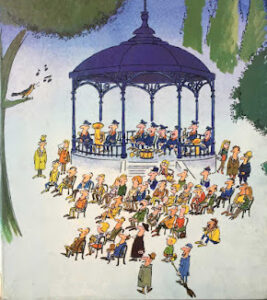
Like Eddie Calvert, I saw the brass band as the logical place to pick up musical skills without fees, my father’s business going through a rough patch.
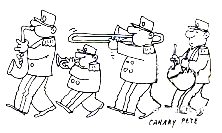
‘The music world would be a lot poorer if there were no such subsidized tuition’, our highly regarded devoted bandmaster Ivan Laing pointed out to me. ‘We may never have known the brilliance of Benny Goodman.
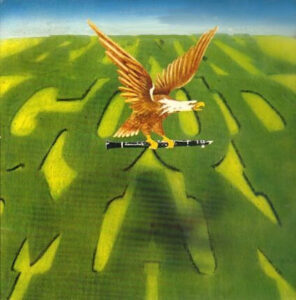
The King of Swing’ owed his training to his father sending him to music classes at the local synagogue. Buckshee. His father could not have done otherwise shovelling animal parts in the stockyards on sweatshop wages.’
Being unnoteworthy, with more enthusiasm than finesse, my humble part was to chime in with the ‘oompah’, tooting my melodious cornet. I played all the right notes, but not necessarily in the right order. My ability on the cornet was legendary; everybody knew I had little.
I played the cornet like nobody else. I played it like a flute.
‘I play it like I’m Hirt.’ I explained to one commentator, referring to the master of the cornet Al Hirt.
‘You are probably using too much pressure. That can hurt your lips and cause a poor performance.’
For some time I only knew two pieces; one was ‘Colonel Bogey’ and the other one wasn’t.
I once played the one that wasn’t solo. Naturally I got a big cheer when I finished.
I was asked, ‘Do you do requests?’
‘Not normally, unless, of course, I am asked to do so.’
I didn’t know the notes that well, but I played in their general vicinity.
During one of my early bandstand performances, we were playing a very sad hymn. I noticed a man in the front row of the audience near me with tears running down his face. When we were finished, I approached him and asked, ‘Are you a devout Christian?’
He replied ‘No I’m a devout musician.’
‘So what is my main sin?’
‘You’re supposed to follow the music, not chase it all over the place.’
‘But I need to play music so much.. I’ve always wanted to play so badly.’
‘Well, you’ve certainly succeeded.’
It didn’t take long for me however to stand out as someone to take note of. There was one especially memorable moment after the wrong music sheet was handed to me at practice. When I began a very difficult passage from ‘Colonel Bogey’, everyone in the band turned and looked at me in wonder and amazement. They were playing ‘Eine kleine Nachtmusik at the time.’
Ivan Laing announced, ‘We’re now going to play another composition Mozart wrote in four flats. That’s because as a growing pauper he had to move three times.’
I had been influenced to take up the cornet by a Scottish migrant, Jock whose instrument of choice was battered and rusty but still delivered its characteristic warm, mellow tone.
.‘What led you to take it up?’ I asked him.
You may not believe this,’ he said. But I came across it in the garden of a house I moved into in Glasgow. The wife of the previous owner didn’t take to it at all and buried it along with her marriage.’
‘You mean to say you dug it up?’
‘aye. I rooted it oot!’
The band hall adjoins sporting facilities. It’s next to the town’s basketball court.
When I played Mozart, Mozart lost.
Over the period I was with the band period I helped raise funds through raffles and housie for the benefit of brass band music; of course, a lot of people claimed that that was my way of paying for the damage I’d caused it.
To teach me embouchure and the mechanics of this brass instrument properly was the lot of our principal solo cornettist, John Hinton.
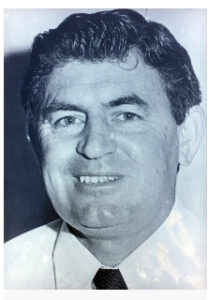
There’s nothing to it, buggerlugs’, he advised. ‘Just watch me and it’ll all become clear. Just do it the Wright way’, he smiled, referring to Tommy Dorsey’s female vocal:
‘I blow thru here
The music goes ’round and around
Whoa-ho-ho-ho-ho-ho
And it comes out here
I push the first valve down
The music goes down and around
Whoa-ho-ho-ho-ho-ho
And it comes out here
I push the middle valve down
The music goes down around below
Below, below, deedle-dee-ho-ho-ho
Listen to the jazz come out
I push the other valve down
The music goes ’round and around
Whoa-ho-ho-ho-ho-ho And it comes out here’
The main source of music in the town, the traditional British brass band was at the service of the community. In our “lion tamer’ uniforms with peaked caps and gold braid, we led the solemn Anzac Day march. Ahead of the army reserve we moved in step as a unit and in formation, coordinating the movements of close order drill with precision, with the beat or cadence bang on, sounding off between full-band pieces:
‘Hib-hub, hib-hub, hib-hub, hib-hub The heads are up The chests are out The arms are swinging And cadence count Sound off, sound off, Sound off, sound off, Cadence count 1-2-3-4 (1-2, 3-4) Enie, Meanie, Minie, Moe Let’s go back and count some more Sound off, sound off, Sound off, sound off, Cadence count 1-2-3-4 (1-2, 3-4) I had a good home, but I left (you’re right) I had a good home, but I left (you’re right) Jody was there, when I left (you’re right) Jody was there, when I left (you’re right) Sound off (1-2) Sound off (3-4) Cadence count 1-2-3-4 (1-2, 3-4)’
We entertained local people through concerts, parades, park performances, opening events, ceremonial occasion, church fetes and a wide variety of public engagements.
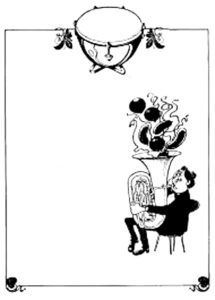
Eat your heart out, Mick Jagger! I have read that Sir Mick has ruled out the idea of writing his memoirs as he considered his life too ho hum.
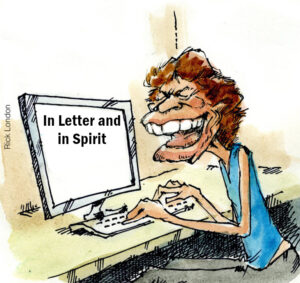
It must have been, increasingly restricted to huge overcrowded gigs with an avalanche of anonymous faces straining to see the stage. Boring! When I consider the extremely diverse repertoire of the Gunnedah Municipal Band performing classical, contemporary, sacred and military music, I feel frightfully sorry for this frustrated Rolling Stone reeling out his rock and roll standards over and over again. Boring! And can you possibly blow and toot and pound drums up and down the streets to the strain of ‘Jumping Jack Flash’. Then there’s the matter of the audiences – did Sir Mick ever experience the intimacy of gigs where the bandsmen outnumbered the audience. Did he ever see grateful pensioned off geezers and blue rinsed matrons charmed, get their ya-ya’s out, a twinkle in the eyes as their toootsie wootsies got tapping, tearing into favourite melodies.
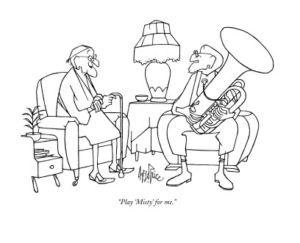
Small wonder he couldn’t get any satisfaction. Singing hey rig-a-jig, kiss a little pig, follow our band!
Our kingpin bandmaster Ivan Laing had been pointed out to me when I first saw them performing.

Moving my teenage head to see if I could recognize him, I had asked someone which one Ivan was.
‘That’s him’, they nodded. ‘The one in the way.’
Ivan wasn’t a fulltime musical director of course. He worked in a department store. He was a semiconductor.
Joining the group, I demonstrated to them a basic musicological fundamental from the word go. As I made my first grand entrance into the bandhall, Ivan was just quizzing the guys as to which scale they were playing in. Tripping over a tangle of electric cord, landing on my back, I gave trumpeter Bill Syphers the very prompt he needed: ‘A flat minor.’
I felt rather diminished. After a brief interval Ivan augmented the situation advising me, ‘You’ll have to be more sharp in future.’
Under his baton our ensemble rehearsed long ahead for the competition circuit sweating it out, keeping in time with him. While the townsfolk were splashing around cooling off in the adjacent municipal swimming pool, Ivan never faltered, working himself up into a solid lather putting us through our paces.
‘All right,’ he’d say, ‘now once more with feelings and not so half-hearted. Remember guys, only the once. Time is tight, time is very tight.’
Orchestrating the talents of seasoned players of a high standard playing alongside the like of kids like me demanded the patience of Job. As it was Ivan was just the job. His expert ear would detect when anyone was playing louder or softer than they should: ‘No, no, no, gentlemen let’s not strike any false notes here. First things first. We need intonation, accuracy, and pitch. Press that in your book of memories. We want a melody, not a malady. It may not be alright on the night. Remember, it’s all about the team, not the individual’, he drummed into us unremittingly, pushing our musicianship and personal level of performance higher ‘Where are you bush callithumpians going? I’m not going over all this again. Your parts seem to be all rests. You’re better than this,’ he would habitually interrupt, tapping his stand, just as we had struck up, ‘now straight ahead, strive for tone and take it away!’
One wintry evening he interrupted play when my music stand went flying. ‘What’s up now?’ he demanded. ‘I taut I taw a puddy tat a creepin’ up on me,’ I tweeted, ‘I did! I taw a puddy tat as plain as he could be!’ Then we all spotted the culprit, a pussycat that had strayed in from the street. It was meowing and fluttering loudly. Shooing away this varmint briskly, Iven was being a bit too finicky, I taut. ‘Take it easy, Ivan,’ I said. ‘There’s no ladder in here. This cool cat just wants to hear some hot sounds close up’.
‘I’m not superstitious, Allan’, he said, ‘that just brings bad luck. But Sylvester has to vamoose.’
‘Go easy, Ivan,’ said John Hinton,’ we all make mistakes. To err is human; to purr, feline.’
‘This is no place for our felid fans. I don’t care to fetch up with Bernstein’s Allergy.’
‘What in dickens is that,?’ I asked.
‘As a young man Leonard Bernstein once had difficulty seeing the music while being tested in his conducting class.
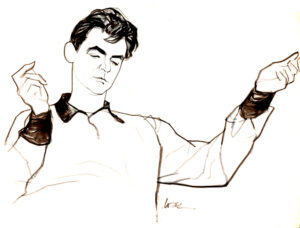 Of all things he was coming down with an allergic reaction to a tabby tom. I can’t afford the remotest chance of furball fever. What with the contest coming up.’
Of all things he was coming down with an allergic reaction to a tabby tom. I can’t afford the remotest chance of furball fever. What with the contest coming up.’
It was the cut and thrust of band contesting that led us to strike up at regional centres and cities. Our aim was to fly to faraway places. This led me to value the camaraderie of amateur musicians from all walks of life. Passionately committed to his musical ensemble, Ivan encouraged me to widen my musical education. ‘Whatever you’ve learned here won’t be lost on you. You might branch out into some other kind of music. Look at Paul McCartney. His dad took him to brass band concerts when he was a tot. Look where young Macca is today. He filtered these influences of the people’s music through his own experiences. You yourself might just want to appreciate music more deeply. It doesn’t matter if you don’t go on beyond that. Get your wings with us and build on that. Music is the international language. Wherever you go, whatever you want to say, say it with music.’
Iven swelled with pride over our band hall, its walls lined with cups and trophies, mementos from past accomplishments. Looking up at these awards after I practised with them several years later, I told Ivan “You must be proud of having built up this flourishing band. Was this what you always wanted to do?”
‘Always. It’s what I’m best at. I’ve got rhythm. I’ve got music.’
‘Who could ask for anything more?’
‘Just thinking about it seems to strike a chord even in our chimpanzee cousins, ’he said pointing to the notice board on the wall. It had pinned to it a postcard of a trio of them with brass instruments.

‘They look as though they’re waiting to evolve so they can play .’
‘Well when they do we’ll be sure to sign them up with us,’ Ivan said.
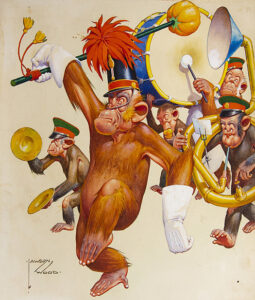
‘Band music is in my blood, laddie. This outdoor kind of music has been beating inside me since I was knee high to a grasshopper. One of my first memories was when our family joined the throngs waving streamers, lining the ticker taped streets to welcome home the troops from the Great War. Togged up in our Sunday best to attend band concerts in the park – weather permitting. It was on these occasions I realized the power of music to stir people.
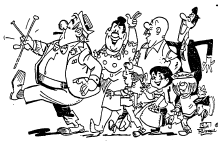
To march men into battle. To supply entertainment where there was a dearth. To allow us to enter an inner world. To reach emotions that go beyond words. So I wanted to form the best band in the bush.’
‘The cat’s whiskers you might say.’ I replied with a mischievous wink. ‘Did you consider going beyond leading a small town amateur band?”
“I long nursed an ambition to do something on a grander stage, something more elaborate, more orchestral – produce glorious symphonic sounds – with clarinets, saxophones, French horns, soaring violins, crashing cymbals and thundering tubas – the whole kit and caboodle.”
Like Sergeant Peppers’, I suggested, ‘singing Polly Wolly Doodle,’ referring to the fictional psychedelic marching band, top of the pops at the time.’
‘We’d really turn on the locals in our garish satin bib and tucker, dyed in funky day-glo colours,’ chortled Ivan.

‘Growing moustaches beards and long hair’, I added, ‘spelling out our name with flowers.’
‘Did you ever try composing music, Iven?’
‘I had a go at writing jazzy music for band and choir. I wrote verses easily, but I had trouble with the chorus. None of the girls would go out with me.’
What about you, John? I asked of John Hinton.
‘ Some like it hot’ he replied. ‘The jim-jam-jump with the solid jive, Makes you nine foot tall when you’re four foot five’. ‘ Well, twirl my turban, man alive!Here comes Mister Nine to Five.’
‘I‘ve long hankered to be more adventurous, bopping, cutting in and jazzing it up with loose bluesy, ricky ticky numbers, rocking dance pieces– and sounds to soothe the soul. ‘Four beats to the bar-and no cheating’ to quote Count Basie. Catering to the widest and deepest range of emotions and impulses. If our bands are going to keep being a draw, we have to widen our appeal and keep up with the times. Our music just doesn’t do it for younger people. We can’t afford to be seen as stick-in-the mud. We have to break away from our traditional stylings, add other elements to our repertoire. It don’t mean a thing, if it ain’t got that swing.’
‘We should try some. Show it off when we go by plane. Can we do Glenn Miller?’ I asked him. ’
‘What, fly off in the fog. Perish the thought. Seriously though, the best music in creation does come from fusion. We can learn a lot from the New Orleans brass bands. That’s where Satchmo’s pubescent cheeks first swelled out- blowing his cornet. These hepcats improvise, blending our heavy metal martial music with the African folk music brought to the Americas by slaves. Of course, you need a special personnel for such magic and they are far and few between. With what we’ve got, we’ve got to make do. Salagagoola mechicka boola bibbidi-bobbidi-boo.’
I pictured these two guys swinging together a generation back, balancing this partiality for free, joyful improvisation while maintaining recognizable melodies. Swinging high, swinging low. It was not surprising that we concurred on who we rated our favourite big band player. It was Benny Goodman- that most technically proficient jazz clarinetist, the first jazz musician to gain a reputation as a soloist with symphony orchestras.
